




10 9







10 9

Lipscomb University has a rich history of fostering scholarship and research across various disciplines. The university’s commitment to academic excellence dates back to its founding, and over the years, it has continued to prioritize the advancement of knowledge through scholarly endeavors. In the early years, Lipscomb University established a strong foundation for research and scholarship by emphasizing the integration of faith and learning. This unique approach provided a framework for exploring complex issues within an intellectually stimulating, Christ-centered environment.
As the university grew, so did its dedication to scholarly pursuits. Significant investments have been made to enhance research infrastructure, support faculty development and provide opportunities for student engagement in research activities. This concerted effort has led to the expansion of research initiatives across diverse fields, ranging from the sciences and humanities to business and education.
From scientific discoveries to impactful social studies to impressive creative projects, Lipscomb scholars are actively contributing to their respective fields and making a difference in the world. This publication aims to highlight the remarkable work being done by our faculty, staff and student researchers across various disciplines. Our commitment to research excellence and innovation is strong, and this magazine serves as a testament to the exciting advancements happening within our campus community. Join us in exploring the diverse range of scholarly work that is highlighted in this magazine, diving deeper into understanding the impact and significance of research at Lipscomb University.


Dr. Jennifer Shewmaker

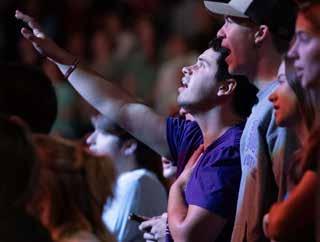
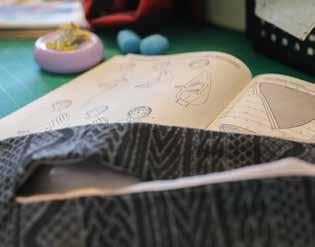

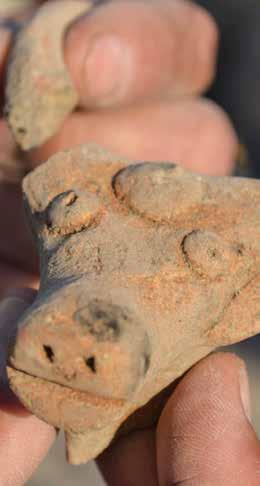
Vice
Kim
Senior
Writers
Kim Chaudoin
Janel Shoun-Smith
Keely Hagan
Photography
Design

When the Lipscomb Impact 360 strategic plan was launched in August 2022, one of the far-reaching, and possibly unexpected, goals was to increase research activity and to achieve the American Council on Education’s (ACE) Carnegie Classification of Doctoral University with High Research Activity (formerly known as R2).
It was clear from the beginning that such an aspiration was a bold step for Lipscomb, which is currently classified as a Doctoral/Professional University (formerly referred to as R3), but it was also clear that this achievement would open doors of opportunity that weren’t available previously for the university, its students and the community.
Not only does this goal fall right in line with our core values of embracing collaboration, seeking to learn, finding solutions and serving others, but attaining this classification is also a statement about the maturity and nature of the university and what its capabilities are. Institutions with this status are viewed differently and are more competitive when applying for external funding and grants from federal and state agencies and from private foundations.
To be classified as an R2 university, there must be 20 or more doctorates awarded annually and $5 million or higher must be spent per year on research and development activities. As of summer 2024, Lipscomb is more than a third of the way toward the goal of eligible research expenses annually.
Lipscomb’s three qualifying doctoral programs—the Ed.D. and two Ph.D.s,—already graduate well over 20 students a year and have since 2012. With the launch of the new Office of Research and Grants in 2022 and and its continual work to support and document ongoing research expenditures at Lipscomb, the university has already moved from reporting $321,000 in research expenditures in 2021 to reporting $1,946,000 today.
These programs provide opportunities for funding student research assistantships while working with faculty in a range of academic disciplines. There are numerous opportunities for meaningful investment in research as we strive to serve others and build a better future for our community.
There is a commonly-held notion that as universities become more research-oriented, or move up in Carnegie classification, they become less focused on students and more narrowly focused on research for the sake of research. This notion is being disavowed at Lipscomb as the road to R2 has been squarely about providing student opportunities and leadership in research from the start (pages 4-19)
Lipscomb has been a leader in undergraduate research for more than a dozen years, having become a member of the Council on Undergraduate Research in 2011. We are also known for hiring research practitioners who develop graduate research opportunities that involve students from idea conception to outcome dissemination (page 40). As a result, Lipscomb is redefining what being a research institution is and is developing opportunities for all types of students.
In fact, undergraduate learning opportunities are at the center of our R2 journey with research projects providing students paid summer jobs, class-wide research embedded in course curriculum (page 9) and projects involving many community partnerships (page 4). It is possible—and even preferable—to be a stellar teaching institution and have high levels of research happening with students. This combination supports greater learning, depth and opportunities.
Lipscomb’s faculty and students are involved in research in science, engineering, technology, faith (page 32), health sciences, pharmacy (page 20) and education among other disciplines. University faculty are engaged in numerous research grants and subgrant awards (page 44), and the Office of Research and Grants is growing in its capacity to apply for and attract more grants than ever before.
We are actively seeking friends of the university who are interested in assisting Lipscomb to reach its annual goal of $5 million of eligible research expenses, making its vision to become a respected center for knowledge creation and dissemination a reality.
This goal will advance Lipscomb to its next important stage in the life of a higher education institution. It represents an opportunity to transform the institution to a level of prominence, positioning it to take advantage of opportunities that are currently out of reach. It will allow us to embrace ambitious service to others through research and innovation.
And here at Lipscomb, where we do things a little differently, this goal will accomplish all of that with students as the focus, preparing them to be purposeful, servicefocused changemakers in any field (lipscomb.edu/youdiscover).

Dr. Candice McQueen President, Lipscomb University
The first 13 students in Lipscomb’s new Doctor of Philosophy in leadership and policy began their studies in August 2023.
As the fifth doctorate established in Lipscomb’s history, the new Ph.D.’s curriculum allows students’ knowledge and skills to be applied to various fields such as education, public service, health care or public policy leadership.
Not only does this 63-hour, three-year program prepare students for high-level careers in leadership and service across a range of sectors, but it also helps prepare Lipscomb to continue to grow doctoral education and research activities into various academic disciplines in the future, said Associate Provost for Research and Graduate Studies Dr. Trace Hebert
“The Ph.D. is comprised of a set of core courses that can be used by any of Lipscomb’s colleges. Then colleges can also offer a set of guided electives specific to their academic discipline. This allows them to develop their own Ph.D. cohort in an efficient way,” said Hebert. “Once they have developed critical mass, the college could potentially develop its own stand-alone doctorate.”
“This approach is starting new conversations among various departments on campus; conversations that are helping the doctoral world grow at Lipscomb,” he said.
Dr. Candice McQueen (BS ’96) and Hebert began to vision the new Ph.D. not long after McQueen’s arrival as president. It was determined that the College of Education was the best suited to host the degree. However, the umbrella is larger than just education, said Hebert. Potential students work in a variety of sectors including education, public service, health care, as well as for-profit and nonprofit organizations.
The skills taught in the program include the ability to organize substantial amounts of information, research subjects broadly, independently manage and complete in-depth projects and to adapt to change.
Learn more about the Ph.D. in leadership and policy at lipscomb.edu/phds

Lipscomb’s three doctoral programs that count toward R2 status have graduated more than the required 20 students per year since 2012.
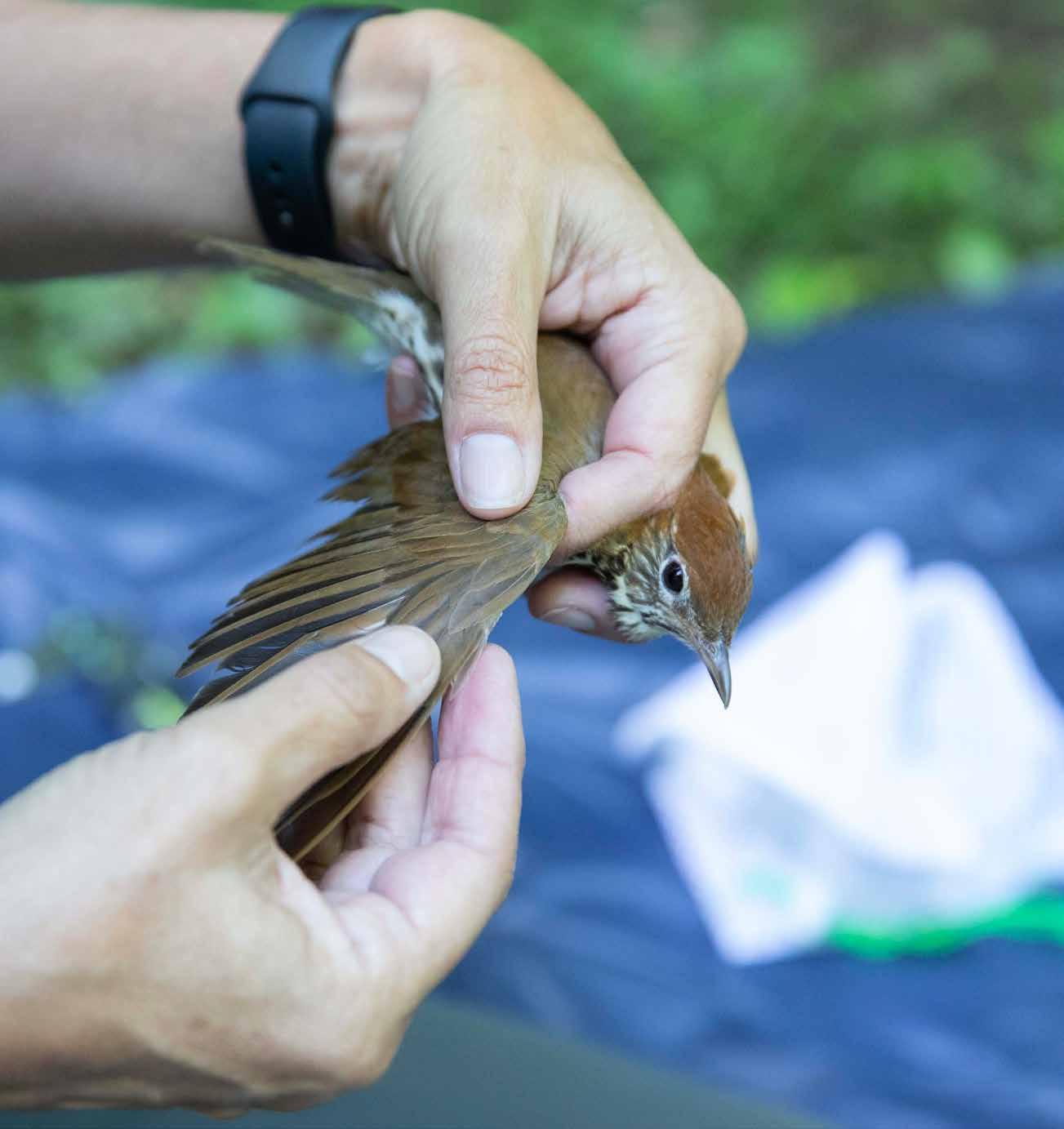

his summer at Nashville’s Warner Parks, visitors may spy more than bluebirds or purple martins. They may catch a glimpse of Lipscomb student interns conducting cutting-edge research for the U.S. Fish & Wildlife Service.
Lipscomb biology students have served as interns at the parks for nine summers, but this year brought a special opportunity to be part of an international conservation project to track the wood thrush.
Working with Laura Cook, bird research coordinator at Warner Park Nature Center, Lipscomb junior biology majors and student interns, Amelia Browning, and Alexandra “Lexi” Price, are contributing valuable data to the study of the bird’s migration patterns throughout the hemisphere. The initiative currently involves bird-conservation partners in 19 U.S. states and Canada, Mexico, Belize, Guatemala, Honduras, Nicaragua and Costa Rica.
The goal is to deploy 600 Motus tags to better understand migratory connections, routes, timing and survival across the full life-cycle of the wood thrush to improve understanding and better plan for and address the conservation needs of the birds, a U.S. Geological Survey-designated Species of Greatest Conservation Need.
The Motus technology is one of the first such technologies light enough to use on small songbirds, said Dr. John Lewis (A ’00), biology professor, who has supervised Lipscomb’s Warner interns since 2016. Motus tags are tracked by radio towers nationwide, including 30 in Tennessee (two of which are in the Warner Parks). The goal for Tennessee is to tag 25 birds in May through July, he said.
The U.S. Fish and Wildlife project is an opportunity for Warner’s BIRD (Bird Information Research and Data) program to share its research, carried out with the help of Lipscomb interns over the past two summers, with a research project much larger in scope.
“I am putting them in charge of finding the wood thrushes’ breeding territories located in the park within range of a Motus station,” said Cook. “They listen for the males’ songs, take time to observe their locations and document any consistency they find.
“They then assist me in playing back vocalizations that will get the wood thrush to come down into the netting so we can capture them, put on transmitters and deploy them. The interns will monitor the area with handheld receivers in order to do health checks to be sure they are healthy and to document their behavior,” she said.
Throughout the years, Lipscomb students have participated in numerous hands-on, longterm research projects focusing on avian ecology, including banding projects, radio-tagging initiatives and species-specific studies, during the nine-week summer internship program conducted in collaboration with the BIRD Program, Metro Nashville Parks and Recreation and Friends of Warner Parks.
“Working alongside the ornithologists at the park instills a passion in our students,” said Lewis. “This type of research experience can set students apart when they are applying for a graduate program or a job. They have proven experience in taking an idea, doing the field work, writing it up and going all the way to presenting their research at a professional

conference. They also gain tangible skills through their experience in putting a band or a radio tag on a bird and knowing how to use the tracking equipment.”
This is the second summer internship for Browning, who studied wood thrush nesting behavior last year. She and Price are also volunteers at the park throughout the year.
“When I started last year, I had no idea that we would do so much, like learning how to band baby birds,” said Browning. “Last summer we interacted with the state ornithologist. I never thought I’d get to do any of that as a then-sophomore in college.
“I think this summer is really valuable because not many people have the opportunity to work on a project with this many people. We have been able to hear other people’s techniques and share experiences, which could be helpful for future research endeavors,” said Browning.
Price and Browning are also helping to lead a workshop as part of the wood thrush project for several researchers from around the state. “It has been so much fun to meet other researchers from different parts of Tennessee and make connections. I have really enjoyed having an entire team working to find wood thrush nests instead of doing it by myself like last year,” said Browning.
Before her Warner internship, Browning “thought research meant a lot of lab work and I just wanted to be outside. Once I started the internship, I realized how great hands-on research could be, and so now I would love to go into ornithology research,” she said.
Student interns select their own research question to study and see it through from data collection to presentation at a professional meeting, said Lewis. “Not many undergraduates are afforded that opportunity
and it is a very real way our students have benefitted from this partnership with Warner Parks,” he said.
Every year, interns present their research projects at the university’s Student Scholars Symposium, and most also present at regional and national conferences, said Lewis. Senior Anna Money, a Warner intern in 2022 and 2023, presented her research at the Purple Martin Conservation Association’s Purple Martin Conference in 2022. Last fall, 2023 interns Browning and Anna Sawyer (BS ’24) made poster presentations at the national conference of the Inland Bird Banding Association, which was held at Warner Parks that year.
“It was the first time I had done my own research and the first time I had presented my own research,” said Browning. “I’d never been in such a big group of people with the same interest. It was just so
fascinating for people to come up to me and ask questions about the poster and be able to have a conversation with them on a different level because they knew what I was talking about.”
Browning is continuing her research study on how the nesting and breeding behavior of wood thrushes is impacted by human activity during her internship this summer as well as expanding the study to Timberland Park on the Natchez Trace Parkway in Franklin, Tennessee. “It’s less trafficked so I want to compare the two for the thrushes’ nesting behavior,” she said. “Typically their nests are around our eye level but in areas with a lot of human activity, the nests are much higher.”
In addition to studying the wood thrush, ongoing research includes tracking a colony of about 30 barn swallows that nest in the Steeplechase stalls. Students also study other species including purple martins, ruby-throated hummingbirds and eastern bluebirds.
The park’s research and Motus towers have opened doors connecting Warner and Lipscomb with other groups working on tracking and conservation, including a special project two years ago when

purple martins had roosted in the trees at the Schermerhorn Symphony Center in downtown Nashville. During that time, Lipscomb students were able to track a purple martin that had been caught and banded at Warner Parks then became part of the huge roost in downtown Nashville and then migrated all the way to Costa Rica, said Lewis.
“This is a fabulous partnership,” said Cook. “In one sense, the interns are extra hands, helping us out with summer bird banding and monitoring the barn swallow nests, in addition to their individual research. But the bigger part to me is
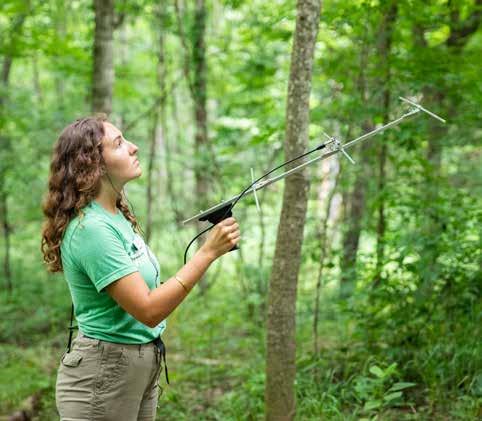
watching them learn how to observe the world differently, understand it differently and opening up their senses to nature that’s all around them.”

Partners like Warner Parks help amplify the power of discovery. Scan the code to read more and to partner with Department of Biology on conservation projects and more, contact john.lewis@lipscomb.edu
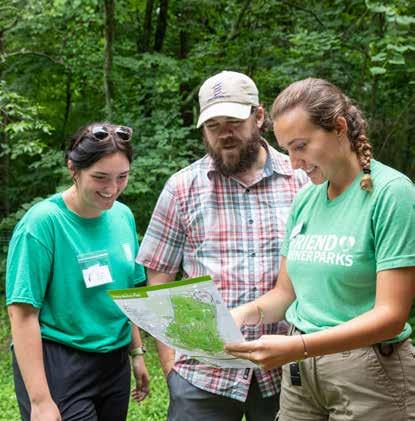
It’s the communication of new knowledge gained through research that truly impacts society and spurs positive advancement. Lipscomb’s students, even in their undergraduate years, play a vital role in sharing the research
Children’s Spirituality
Summit: A Child’s Way Deerfield, Illinois, May 2024 College of Bible & Ministry
Mentor: Dr. Holly Allen
Gabriella Brandner (BA ’24)
“Nurturing Children Spiritually in an Afterschool Program: Insights from Qualitative Research”
Inland Bird Banding Association
Nashville, November 2023 Department of Biology
Mentor: Dr. John Lewis (A ’00)
Amelia Browning
“Nesting Behavior of the Wood Thrush”
Anna Sawyer
“Detection Range, Height and Cloud Cover Effects on Signal Strength of Hybrid Tag Radio Transmitters on Birds”
Association of Southeastern Biologists and TriBeta Biological Honors Society Chattanooga, March 2024 Department of Biology
Mentor: Dr. Kyle Brawner (BS ’12)
Arlo Colvard, first place in oral presentation
“Indole-3-carbinol Can Rescue Lipopplysaccharide-induced Cytotoxicity in Small Intestinal Epithelial Cells: Implications for Necrotizing Enterocoloitis”
Gabriella Longoria
“Investigation of the Ability of Aryl Hydrocarbon Receptor Activation to Rescue LPS-induced Cytotoxicity in Small Intestinal Epithelial Cells”
Mentor: Dr. Beth Conway
Mariam Iskandard and Christian Yang, tied for first place in poster presentation
“Characterizing Neprilysin’s Regulation of the P13K Pathway in Triple Negative Breast Cancer”
Mentor: Dr. Brian Ellis
Anna Thurman (BS ’24) and Giselle
Domingo Diaz
“Effects of Albendazole on C. elegens Eggs”
Malia Bennie “Emodepside on L4 C. elegens”
Student Managed Investment Fund Consortium
Chicago, Illinois, October 2023
Global Asset Management Education Forum
New York City, New York, March 2024
College of Business
Mentors: Drs. Han-Sheng Chen, Julio Rivas
Kyle Joaquin (BBA ’24), Kendal Matas, Alex Walentynowicz (BBA ’24), Braeden Burrow and Henry Wolfe, Third Place at GAME Forum
“Review of Student Managed Funds for Tennessee Valley Authority Investment Challenge Program”
CFA Research Challenge
Nashville, February 2024
College of Business
Mentor: Dr. Han-Sheng Chen
Kyle Joaquin (BBA ’24), Henry Wolfe, Michelle Dancoisne, Brady Bryson, Richard Cuyuch, Third Place
“An Equity Analysis of Cracker Barrell”
Tennessee Valley Authority Investment Challenge Program Conference
Nashville, April 2024
College of Business
Mentor: Drs. Han-Sheng Chen, Julio Rivas
Natalie Blickensderfer and Henry Wolfe, First Place Performance Award
“Performance Review of the Student Managed Funds at Lipscomb University for TVA Investment Challenge Program”
done in Lipscomb’s labs and classrooms with the nation. Below, check out some of the conferences’ and national meetings where undergraduate Bison researchers spread new knowledge this past school year.
Tennessee Theological Library Association
Nashville, October 2023
Department of Chemistry & Biochemistry and Beaman Library
Mentors: Jan Cohu, Michaela Rutledge and Dr. Joseph A. Weinstein-Webb Leila Ais, Jafer Aljorani (BS ’24), Abigail Hoermann, Timothy Khalil (BS ’23)
“Deadly Dyes: The Poison Book Project at Lipscomb University”
PittCon Analytical Chemistry Conference
San Diego, California, February 2024
Department of Chemistry & Biochemistry and Department of Pharmaceutical Sciences
Mentor: Dr. Matt Vergne Joy Osipchuk
“Development of an LC-MS/MS Method for Intestinal Permeability Determination with Micro-Volume Blood Collection Techniques”
Kennedy Brothers
“Development of an LC-MS/MS Method for the Quantitation of Drugs and Environmental Pollutants in Environmental Waters”
Mentor: Dr. Kent Clinger David Saakov “Synthesis and Analysis of Cyclopropane Fatty Esters”
Georgia Conference on Children’s Literature Athens, Georgia, March 2024 College of Education
Mentors: Drs. Jeanne Gilliam Fain, Sarah Duncan
Erica Diaz (BS ’24), Kayla Hill, Sammi Sanders, Shelby Hallett (BA ’24), Ashlynn Perry and Emma Sutton “Examining Key Aspects of the Environment in Immigration Stories through Visual Analysis in Picture Books”
International Conference on Robots and Systems
Detroit, Michigan, October 2023
Raymond B. Jones College of Engineering
Mentor: Dr. Juan Rojas
Brennan Cottrell and Justice Roberts (BS ’24) “Discovering Symmetries”
Southern Literary Festival Oxford, Mississippi, April 2024, Department of English & Modern Languages
Kearra Weiting (BA ’24), “Play Pretend,” First Place, Creative Nonfiction
Abigail McQueen, “Catcher in the Rye and Post-COVID America,” First Place, Formal Essay. Both will have their pieces published in the SLF Student Literary Anthology.
Sigma Tau Delta St. Louis, Missouri, April 2024
Department of English & Modern Languages
Mar’a Harris (BA ’24), Abigail McQueen, Sean McConnell, Mac Chamberlain, Kearra Weiting (BA ’24), Ashlynn Perry, Abigail Morelock, Katherine Shell, Emma Visker, Courtney Grable
Mid-South Psychology Conference
Memphis, TN, April 2024
Department of Psychology, Counseling & Family Science
Mentor: Dr. Jaclyn Spivey
Rachel Shannon
“The Effects of Chocolate Consumption in Women with Body Image Dissatisfaction”
Southeastern Council for Family Relations
Orange Beach, Alabama, April 2024
Department of Psychology, Counseling & Family Science
Mentor: Dr. Shaun Calix
Zoie West
“Relationships Between Birth and Adoptive Parents in Open Adoptions”
Ongoing efforts to enhance class-wide projects brings research opportunities to more students earlier in their college career.
As part of an overall effort to promote and expand undergraduate research at Lipscomb, the university is promoting Course-Based Undergraduate Research Experiences (CUREs). In this model, research and creative inquiry are embedded into the course curriculum.
CUREs are intended to build on the usual one-on-one, mentor-based model to allow undergraduate students on a broader scale to be introduced to and to carry out research, said Dr. Florah Mhlanga, associate provost of undergraduate academic affairs, who has advocated for research at the undergraduate level throughout her career and who helped establish Lipscomb’s Student Scholars Symposium over a decade ago to highlight undergraduate research.
“Many students are excluded from the mentor-mentee research model,” noted Mhlanga. “This is particularly true of students who are shy and do not have the confidence to actively seek out undergraduate research opportunities from faculty, students with limited knowledge of career structures and those who may not have performed well in their courses. Entry into a CURE only requires undergraduate students to enroll in the course. As such many more students can be exposed to research compared to the traditional mentor-mentee approach.”
In addition, “one of the major benefits of CUREs is that they broaden the participation of students from underrepresented groups thereby creating educational equity,” said Mhlanga.
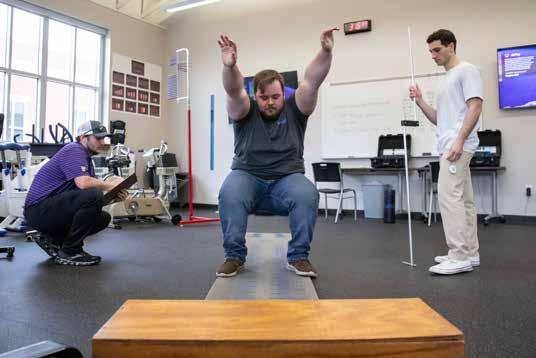
offered this academic year included courses in biology, kinesiology, engineering, English, computing, business, music, nursing, and law, justice and society, among other disciplines.
♦ In kinesiology, students have been studying the optimal hours of quality sleep needed by student athletes.
♦ In engineering, students are comparing energy usage from a mix of scientific sources and non-scientific sources.
♦ English students are researching a historical artifact or cultural practice used in a novel.
♦ Nursing students are delving into the effectiveness of certain drugs on diabetic weight loss and blood glucose management.
The provost’s office is also actively working with several course instructors to develop CUREs and is collaborating with the associate chair of general education to embed CUREs into first-year general education courses.
Embedding CUREs in freshmen-level courses exposes students to research and creativity early on. Benefits for students who participate in CUREs from freshman to senior year include increased gains in content knowledge, improved analytical and technical skills and increased confidence in conducting research, said Mhlanga.
Learn more about Lipscomb’s undergraduate CUREs at lipscomb.edu/cures.


In its first year of teaming up students with professional journalists on extracurricular projects, the School of Communication hit it out of the park with a national awardwinning documentary on the Nashville Sounds baseball scoreboard.
In 2024, another team is working on a second documentary on an even more well-known historic sports icon: Gen. Robert Neyland, legendary coach of the University of Tennessee Vols football team and namesake of the landmark Neyland Stadium.
Both projects were mentored by professional-in-residence and veteran journalist Demetria Kalodimos, who anchored and reported news for nearly 40 years and has won some of the top awards in broadcast journalism including 16 Emmys.
Throughout the spring semester, Kalodimos and students Ben Barry, Anastasiia Bolydreva and Paiton Walker (BA ’24) researched aspects of Neyland’s life, archiving Neyland family documents and photos and carrying out video interviews with the last two members of any football squad coached by Neyland (who retired from coaching in 1952).
Kalodimos, Barry and Bolydreva have interviewed: James Haslam, who was the captain of Neyland’s 1951 championship team, father of former Tennessee Gov. Bill Haslam and
founder of Pilot Corporation, one of the largest privately owned companies in the U.S.; and Mack Franklin of Hermitage, Tennessee. They have taken two trips to Knoxville to interview Haslam and Phil Fulmer, Vols football coach from 19922008, and also interviewed Neyland’s son, Blake.
“Ben is settled into the role of interviewer but is also learning some of the technology. Anastasiia is our budding videographer,” said mentor Kalodimos. “We are locating old film footage through the National Archives, newsreels
primarily, that featured big bowl games in the 1950s.”
“I’ve learned how to ask engaging questions and pace the questions during the interview to keep it feeling authentic and conversational,” said Barry, a junior sports media major from Lombard, Illinois. “I’ve learned how to think on my feet and ask follow-up questions on the spot to get better answers. I’ve been told many times by my professors and by Demetria that ‘good interviewers know how to ask questions; great interviewers know how to follow up.’”
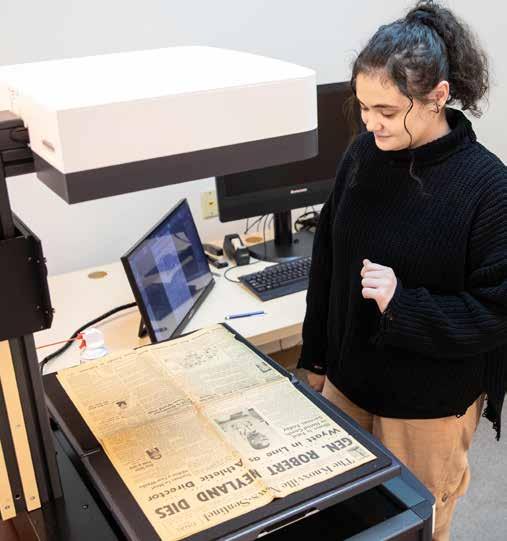

Bolydreva, a junior journalism and new media major from Saint Petersburg, Russia, focuses on working the video equipment, including the lighting, which can often mean lengthy setup or arranging the equipment in a very tight space.
“It has been helpful to see how a documentary comes together and eye-opening to see how long and energy-consuming the process is,” she said.
The Neyland project is the second impactful documentary project carried out by Lipscomb students. In spring 2022 Kalodimos and her student team of then-seniors Shawna Mann (BA ’23), Spencer Barnabee (BA ’22), Emma Shanahan (BA ’23) and Kahwit Tela (BA ’22) were accepted to present their documentary Grand Ole Guitar at the 33rd Cooperstown Symposium on Baseball and American Culture at the National Baseball Hall of Fame and Museum in Cooperstown, New York.
Later, in 2023, Grand Ole Guitar was one of only eight projects nationwide to receive a prestigious Edward R. Murrow Award, one of the most esteemed honors in the journalism industry. The Murrow Awards are the embodiment of the values, principles and standards set forth by Murrow, a journalism pioneer who set the standards for the highest quality of broadcast journalism.
The 18-minute documentary tells the story of the guitar-shaped scoreboard that was an icon
for decades at Greer Stadium, former home of the Triple-A minor league affiliate Nashville Sounds.
“Guitar required quite a bit of research of visual elements, through the internet and the personal collections of those we located and interviewed, including photos and clippings, etc.,” said Kalodimos. “We were lucky enough to find a former Nashville journalist who had flown a drone over the original scoreboard before it was dismantled. That turned out to be visual gold.”
“The students were tasked with reaching out to potential interviewees, and we had sit-downs with local baseball historian Skip Nipper, founder and former Sounds president Larry Schmittou and Cy Young Award-winning pitcher R.A. Dickey,” explained Kalodimos.
These two documentaries are models for the way the School of Communication continues to bring the latest in journalistic methods and technology to its students, said Sarah Gibson, professor and director of the school.
The idea for the Neyland documentary was sparked by Lipscomb’s Dr. Tim Johnson, the Elizabeth Gentry Brown Chair in History, who has been providing historical consultation for the project.
Blake Neyland graciously provided a box of photos, clippings and letters that the family has held for years. Also, when he was interviewed for the documentary film, he brought along two of General Neyland’s cadet jackets from West Point, coats that had been kept in pristine condition
by a family friend and then gifted back to the Neyland family.
Among the archival materials loaned from the family, were photos of Neyland as a cadet at West Point and in his West Point baseball uniform, where he was a star pitcher on the team. Walker, a senior in animation from White Bluff, Tennessee, has spent several months this spring “giving them the archival treatment,” said Johnson.
Walker first inventoried the items, measured all the photos and wrote descriptions of each piece to aid future researchers in finding them again, she said. Each item was put into a protective sleeve with the help of library student intern Emily Czap, a student in the IDEAL (Igniting the Dream of Education and Access at Lipscomb) program.
Walker plans to attend the University of Tennessee-Knoxville to obtain her master’s in library and archival work, so she has been excited to learn the history of Neyalnd’s life and career through this archival project.
“When you work on a project like this, one that’s very specific, you get to know the subject in a very interesting way. It almost makes you feel like you’re walking through history with them,” said Walker.
Learn more about the School of Communication documentary at lipscomb.edu/neyland.

Since fall 2022, Dr. Susan Hamond, chair of computer science, has involved around 20 undergraduate computing students in support of a National Science Foundation-funded effort to develop a new software tool that in the future could be used in schools and universities nationwide to assess soft skills.
Hammond hopes to have a prototype of Skill Builder, designed to allow classroom instructors to rapidly assess and score students engaged in team-based activities, by this fall.
Hammond and her students are developing the software for the ELIPPS (Enhancing Learning by Improving Process Skills in STEM) Project which intends to develop rubrics to be used by instructors to teach soft skills to people in teams. ELIPPS was funded by an a National Science Foundation grant awarded to three professors involved in the POGIL (Process Oriented Guided Inquiry Learning Foundation) Project, an initiative to increase active learning in STEM in disciplines.
Ironically enough, Hammond’s students in the School of Computing are developing the software to assess soft skills in a course designed to teach teamwork, oral communication and critical thinking skills. Lipscomb’s Software Studio course is a simulated workplace environment designed to teach soft skills along with the fundamentals of software engineering.
Students meet twice a week to work at their software development “company” called Lunatic Labs. Throughout two years of college, 30 to 35 students each semester progress through four roles in the company: junior developer, developer 1, developer 2 and team leader.
Interested in partnering with Lipscomb’s Lunatic Labs in the School of Computing? Scan the code to read more and contact susan.hammond@lipscomb.edu to become involved.
Becoming a great researcher involves collecting knowledge, developing rigorous skills and nurturing a creative spark, but a group of Lipscomb students and faculty learned this past year that it also involves telling the story of how research produces change in a way that makes it meaningful for those in positions of power.
For the first time since becoming a member of the Council on Undergraduate Research (CUR) in 2011, Lipscomb had two teams of students and faculty selected to participate in CUR’s Scholars Transforming Through Research (STR) Program.
STR is a six-month professional development program that trains the teams in research advocacy and hosts them in Washington, D.C., to advocate for undergraduate research to the U.S. Congress. In November, the seven members of Lipscomb’s two teams met with representatives for Tennessee’s Sens. Marsha Blackburn (R-TN) and Sen. Bill Hagerty (R-TN), and Rep. Andy Ogles (R-5) to advocate for undergraduate research in the 2024 Federal Budget.
From October 2023 to April 2024, the teams learned to advocate to various stakeholders including congresspeople, funding agencies, donors and more.
The attending students and faculty are expected to serve as on-campus leaders to advance undergraduate research. Already, Dr. Josh Owens (BS, ’16), assistant professor and undergraduate research coordinator, has been elected a biology division representative for CUR.
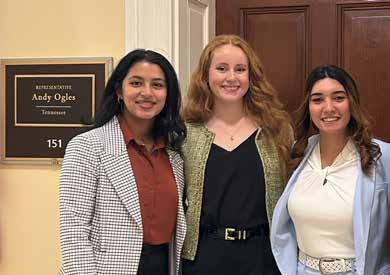
Lipscomb faculty and undergraduate researchers are testing Beaman Library’s 19th century books in line with a national research initiative called the Poison Book Project.
“We are of the opinion that instead of letting books grow moldy behind an iron grating, far from the vulgar gaze, it is better to let them wear out by being read.”
Unfortunately, Vergne didn’t know at the time the harmful effects that many of the dyes in the brightly colored, gilded book covers of the Victorian era could have on avid readers over a long period of time, as they include toxic materials such as copper, arsenic, lead, mercury and chromium.
In 2022, when a librarian at the Winterthur Library in Delaware had a 19th century book with flaking green pigment chemically tested and discovered arsenic, it touched off a nationwide awareness campaign called the Poison Book Project, to inform libraries about the phenomenon and to teach them how to find, test, safely store and use these historic books.
In that same year, upon learning of the Poison Book Project, Beaman Systems Librarian Jan Cohu took up the challenge to identify potentially harmful 19th century books in Beaman’s collections and called in the Department of Chemistry and Biochemistry to test the chemical makeup of the cover dyes. Once so-called “poison books” are confirmed through chemical analysis, Beaman librarians take appropriate actions to safely store the books and implement safety measures for those who want to read them, she said.
Over the past two years, Assistant Professor of Chemistry Dr. Joseph Weinstein-Webb and a group of four undergraduate students have tested 17 books, confirming that some do, in fact, have a toxic element—lead chromate— in the dye. While levels of lead chromate above EPA recommended standards were found in the two cm^2 sample area of the book, it would take long-term chronic exposure at that level, such as inhaling paint particulates, to be harmful, said Weinstein-Webb.
Through the extracurricular research project, the students are learning safe handling of hazardous materials,

data analysis and experimental design, while also contributing to the national bank of knowledge spurred by the Poison Book Project, housed at the Winterthur and the University of Delaware.
“The project made a splash in the library world,” Cohu said. “The Winterthur was presenting findings in arsenical books, which are a bright green color from copper acetoarsenite. The Winterthur library collection is very different from ours, but I was curious about whether anything they had learned would apply to our library. We do have a lot of 19th century books.”
More than 1,000, in fact, fit the criteria of being published between 1800 and 1920, said Cohu. Of that total, Beaman librarians have pulled from circulation all those books with covers of certain colors and marked them as targets for testing. Of those marked for testing, not all of them will end up including toxic elements, said Cohu.
“One of the first ones I pulled actually looked very much like
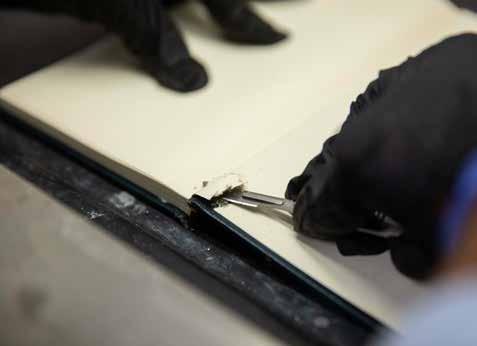

the ones Winterthur suggested and tests confirmed that it did contain toxic dye,” says Beaman Electronic Resources Librarian Michaela Rutledge. “We were off to a great start.”
While the Winterthur Project has mainly focused on testing for arsenic in the toxic pigment emerald green, the Lipscomb group has mainly focused on yellow pigment, providing important data about elevated levels of lead and chromium.
In the summer of 2022, Weinstein-Webb developed a method of testing the book bindings where results can be confirmed using multiple optical tools. When classes began in the fall, students, Timothy Khalil (BS ’23), Jafer Aljorani (BS ’24) and Leila Ais , delved into the testing process using Inductively Coupled Plasma Optical Emission Spectroscopy (ICP-OES) instrumentation, beginning with nine books chosen by the library. A second set of seven was then selected for testing the following year by Aljorani, Ais and Abigail Hoermann
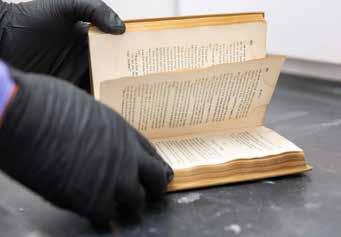
This past school year, the students used X-Ray Fluorescence (XRF) to test the selected books. XRF is a handheld instrument that shoots X-rays to produce a fluorescent photon that is characteristic of whatever element is present. This summer, Lipscomb purchased a new XRF instrument in order to continue testing more books over the summer.
The results over the first two years confirmed concentrations of lead and chromium in the yellow pigment on five books, Adam Smith’s Essays, Christian Immersion, Sketches from English History, Mark Twain and the Happy Island and Mohun
Also this summer, the researchers are taking advantage of a partnership with Vanderbilt University to use that institution’s X-Ray Diffraction (XRD) instrument for measurements on more books. The XRD shoots X-rays and uses the bragg equation to determine atomic distances which indicates the exact crystal structure of the dye.
The impact of Lipscomb’s initiative has been showcased at various academic platforms, including poster presentations at the 2023 and 2024 Students Scholar Symposium (where students won outstanding presenter honors both years) and presentations at the Tennessee Theological Librarians Association. There is also potential participation in the American Chemical Society Conference in the fall of 2024 and plans to submit the results for peerreviewed publication, said Weinstein-Webb.
“This insight into book bindings being harmful to people is not something that is very widely known, which is what we’re hoping to change,” said Hoermann, a senior in psychology and applied chemistry and Weinstein-Webb’s teaching assistant. In the future, the researchers hope to extend their testing efforts to local libraries and book collectors to raise awareness, said Hoermann.
When Cohu and Rutledge presented at the 2024 Tennessee Library Association Conference this spring, a large audience of librarians from across the state attended who were interested in learning more and in how this would apply to them, Cohu said. “They felt like we were giving them something of incredible value.”

Keynote Paul Ayers, awardwinning theoretical chemist, found his calling and career skills in Lipscomb’s science classrooms.
There are few people who could better represent the epitome of a Lipscomb research scientist than the Canada Research Chair for Theoretical Chemistry at McMaster University Dr. Paul Ayers (BS ’96).
Ayers heard his calling at Lipscomb. He built his intellectual and professional skills and his research resume at Lipscomb. He discovered his way to make a difference in the world at Lipscomb.
And in April he returned to Lipscomb to share his career experience with the next generation of Lipscomb researchers during his keynote at the 2024 Student Scholars Symposium (SSS), the university’s annual celebration of the creative and scholarly works of almost 300 Lipscomb students.
Using his own life experiences that led to his career as a theoretical chemist, Ayers passed on sage advice to the young researchers in the audience: failure to get desired results in an experiment does not mean one has failed as a researcher. In fact, he noted, failure is an important part of the process of discovery.
Dr. Paul Ayers (BS ’96), is an award-winning theoretical chemist in Canada, who returned to his alma mater to inspire today’s emerging researchers.
In addition to his work at McMaster in Canada as professor of chemistry and chemical biology, and his postdoctoral fellowship at Duke University, he has also published 370 papers and book chapters, given more than 300 invited lectures and has won a plethora of awards. They include several of the top international awards in the field: the Dirac Medal, the annual medal of the International Academy of Quantum Molecular Science, the Rutherford Medal and a fellowship in the Royal Society of Chemistry.
Ayers holds a Ph.D. in chemistry from the University of North Carolina at Chapel Hill and was a postdoctoral associate in Duke University’s chemistry department, where he held a National Institutes of Health Postdoctoral Research Fellowship.
Theoretical chemistry seeks to provide conceptual, mathematical and computational
tools for describing chemical and physical reactions. By being able to predict chemical phenomena, scientists like Ayers could help open the door for new medical therapies, as well as other technologies, to be developed much faster, less expensively and more safely.
The North Carolina native graduated from Lipscomb with three majors (physics,
mathematics and chemistry), nearly 20 elective courses, a 4.0 GPA and a wealth of research experience from internships and the lab of (retired chemistry faculty) Dr. Paul Langford under his belt.
“Lipscomb was the nest where my scientific life fledged,” said Ayers.
• The Structural Characterization of Tim50 in Trypanosoma brucei
Carolyn Tran, Ward Research Fellowship
• The Effect of Pre-Workout Supplementation on Anaerobic Power Output
Corbin Weaver, Andrew Polk, Stephen Stancill, Kinesiology
• Analyzing Children’s Immigration Picture Books Through Visual Analysis
Erica Diaz, Sammi Sanders, Ashlynn Perry, Shelby Hallett, Emma Sutton, Education
• Why Con-Langs are Bound to Fail
Sydney Sneider, English and Modern Languages
• Putting a Pope on Posthumous Trial: Pope Stephen VI and the Cadaver Synod
Erynn Barrett, History, Politics and Philosophy
• Investigating the Interplay between Toll-like Receptor 4 Signaling and Aryl Hydrocarbon Receptor Activity in Small Intestinal Epithelial Cells: Implications for Necrotizing Enterocolitis
Arlo Colvard, Biology
• Development of a Cannabinoid Testing Method Using Blood Collection Cards and LC-MS/MS
Cora Coletti, Kennedy Brothers, Joy Osipchuk, Abigail Davis, Pharmacy
• Understanding China’s Influence in Latin America and Its Implications: A Case Study of Argentina, Cuba and Venezuela
Kalliope Clayton, History, Politics and Philosophy
• Negative Theology and “The End of the Affair”
Ashlynn Perry, English and Modern Languages
• Drawing on Walls
Anna Camille Floyd, English and Modern Languages
• Biomimicry
Abigail Miller, English and Modern Languages
• Shortened Performance of Lipscomb Theatre’s “I and You”
Justice Orrand, Theatre
POSTER PRESENTATIONS:
• Exploring the Effects of HD5 on Wound Healing in Colonic Epithelial Cells
Maryam Gerges, Biology
• Characterizing the Contributions of Neprilysin, Casein Kinase II, and AKT in Triple-Negative Breast Cancer Migration
Elise Griner, Biology
• A Novel Discovery Platform to Elucidate Novel Microbe-Derived Metabolites and their Effects on Fatty-acid Metabolism
Helana Khalif, Jackson Head, Morgan Martin, Biology
• The Opportunistic Pathogen Cronobacter sakazakii Inhibits Aryl Hydrocarbon Receptor Signaling in Intestinal Epithelial Cells
Paul Agaiby, Lauren Phillips, Eleanor Williams, Biology
• An Analysis of a Targeted Dual Modality Imaging (TDMI) for the Detection and Removal of Head and Neck Cancer
Leah M. Jacob, Jocelyn G. Howland,
Jackie M. Ceballos, Vanderbilt University
Medical Center
• Anatomy Unveiled: Elevating Undergraduate Anatomy Education Through Student-led Medical Illustration
Lauren Blank, Biology and Physician
Assistant Studies
• Pedestrian-Friendly Streets: Assessing Overall Success on Well-Being with PostEvaluations
Ariana Ordoñez, Law, Justice and Society
• Social Turmoil and Adolescent Aggression: An Expanded Analysis of Crime Committed in Tennessee Surrounding the 2020 Pandemic
Allie Melhorn, Rachel Russell, Psychology, Counseling and Family Science
• Exploring the Effects of Maternal Stress on Child Outcomes
Maggie Daugherty, Psychology, Counseling and Family Science
• Effectiveness of Semaglutide Versus Liraglutide and Dulaglutide on Diabetic Weight Loss and Blood Glucose Management: A Systematic Review
Carissa Carron, Ashlyn Koegle, Samantha Owen, Katherine Munn, Adelyn Holliday, Dara Haynes, Nursing
• Interpersonal Violence and Educational Outcomes: From Impact to Solution
Samantha Hurst, Social Work and Sociology
• Comparison of Anaerobic and Aerobic Performance with Preworkout Supplementation in Cycling and Graded Treadmill Tests
• Levi Streeval, Trey Haralson, Exercise Science

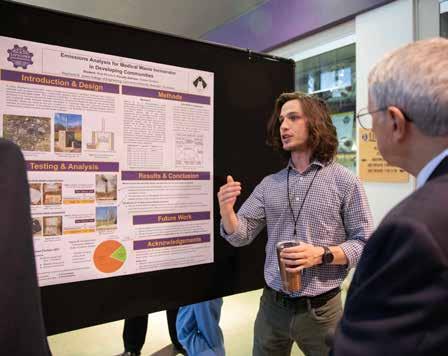
• Development of an LC-MS/ MS Method for the Quantitation of Drugs and Pollutants in Environmental Waters
Kennedy Brothers, Joy Osipchuk, Cora Coletti, Abigail Davis, Pharmacy
• General Solution to the Plane Simple Pendulum
Christopher Wengert, Jaqueline Cabellos, Dominick Dingus, Physics
• Multimodal Detection of Toxic Metals in Victorian Era Book Cloths as Part of the Beaman Library Collection
Leila Ais, Abigail Hoermann, Jafer Aljorani, Chemistry and Biochemistry
• Rheological Effects of Aggregate Properties on Fresh Concrete for 3D-Printing Applications
Aaron Hardy, Engineering
• Multidisciplinary Engineering Solutions for Mitigating Temperature and Humidity Concerns in Biophilic Spaces: A Study of Gaylord Opryland’s Delta Atrium
Alyssa Hampton, Tracie
Santiago, Saly Alammuri, Taylor Crawford, Jonathan Ochoa Guzman, Gracie Hall, Daniel Harvey, Tamyra Kirby, Engineering
Reid Murdock (BS ’23) (pictured above) presented the background and outcomes of his practicum project to become the Raymond B. Jones College of Engineering’s first graduate in its humanitarian engineering minor. Murdock worked with two professional engineers to learn the EPA standards for emissions and the best ways to test a prototype biomedical waste incinerator that engineering students designed, constructed and installed at the Beersheba Springs Medical Clinic in Beersheba Springs, Tennessee. In disadvantaged nations, disposing of medical waste can be harmful to local residents through emissions from open pit burning or the proximity of residents who live near a disposal area. Lipscomb students refined the prototype and built an enclosed bioincinerator for Predisan medical clinic in Honduras. The results of Murdock’s project showed that the incinerator was more effective and safer than open pit burning of biomedical waste.
EVERY COLLEGE AT LIPSCOMB PARTICIPATED IN THE 2024 SYMPOSIUM, WITH BOTH GRADUATE AND UNDERGRADUATE STUDENTS MAKING 172 PRESENTATIONS ON RESEARCH AND SCHOLARSHIP IN A WIDE VARIETY OF FIELDS OF STUDY.
In fall 2023, 42 students from 12 majors collaborated to present the “Dolly Parton and the Makers: My Life in Rhinestones” exhibit, which drew 8,000 visitors from across the globe to campus. Eight students from graphic design, fashion, hospitality, film and studio art majors participated in a panel discussion at the symposium (at right), highlighting what they learned and accomplished by managing the event. Through the scholarship and hands-on application required by the months-long project, students learned leadership skills, the realworld processes involved in their chosen major, how to pivot quickly and how trying something new can uncover a new passion. “I learned that leadership is an opportunity to empower other people,” said Bex Olesek (BFA ’24), student lead for gallery installation. “You are given this role in order to empower other people to do what they love.”
One group of four undergraduate students headed to the symposium’s winners’ podium twice for their presentations on two types of chemical analysis carried out under the mentorship of Dr. Matt Vergne, associate professor in the pharmaceutical science department (at right) Kennedy Brothers, sophomore in pre-pharmacy (at right), led the student team to develop a method to determine trace amounts of artificial sweetener (a marker for urine) and illicit drugs in river water by liquid chromatography mass spectrometry (LCMS), with the goal to assess the impact of humans on the environment. Cora Coletti, a junior in English, led the team in developing a way to use LCMS to measure the amount of illicit drugs in a finger prick of blood, as a potential future tool for law enforcement at traffic stops. The team was able to test for cocaine, ketamine, magic mushrooms and antidepressants. Students Joy Osipchuk (BS ’24), biochemistry major, and Abigail Davis, freshman pre-pharmacy major, contributed to both the research work and the presentations.
“Nurses need to have an understanding of nursing research and how to find and use it in their daily practice,” said Jennifer Hicks, instructor in Lipscomb’s nursing program. Consequently every Lipscomb nursing student is required to take a nursing research and theory course to learn how to search for current literature by nurse scientists or other disciplines to answer questions about nursing care issues and to translate the new knowledge found into practice. In 2024, her 51 students presented (at right) nine scholarly systematic review research posters on topics of interest, including how forensic nurses can promote healthy recovery for victims of trauma, virtual reality strategies to help children cope with the pain of intravenous catheter insertions, comparisons of water birth versus conventional birth, and factors that contribute to nurses’ burnout.

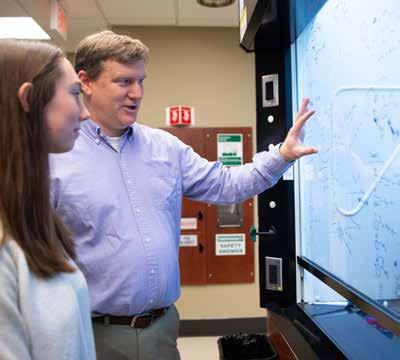
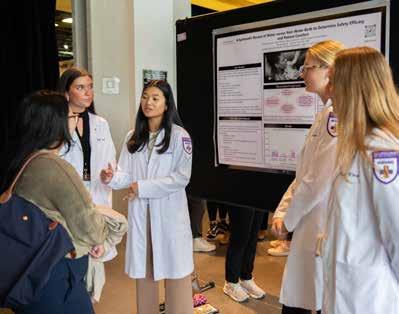
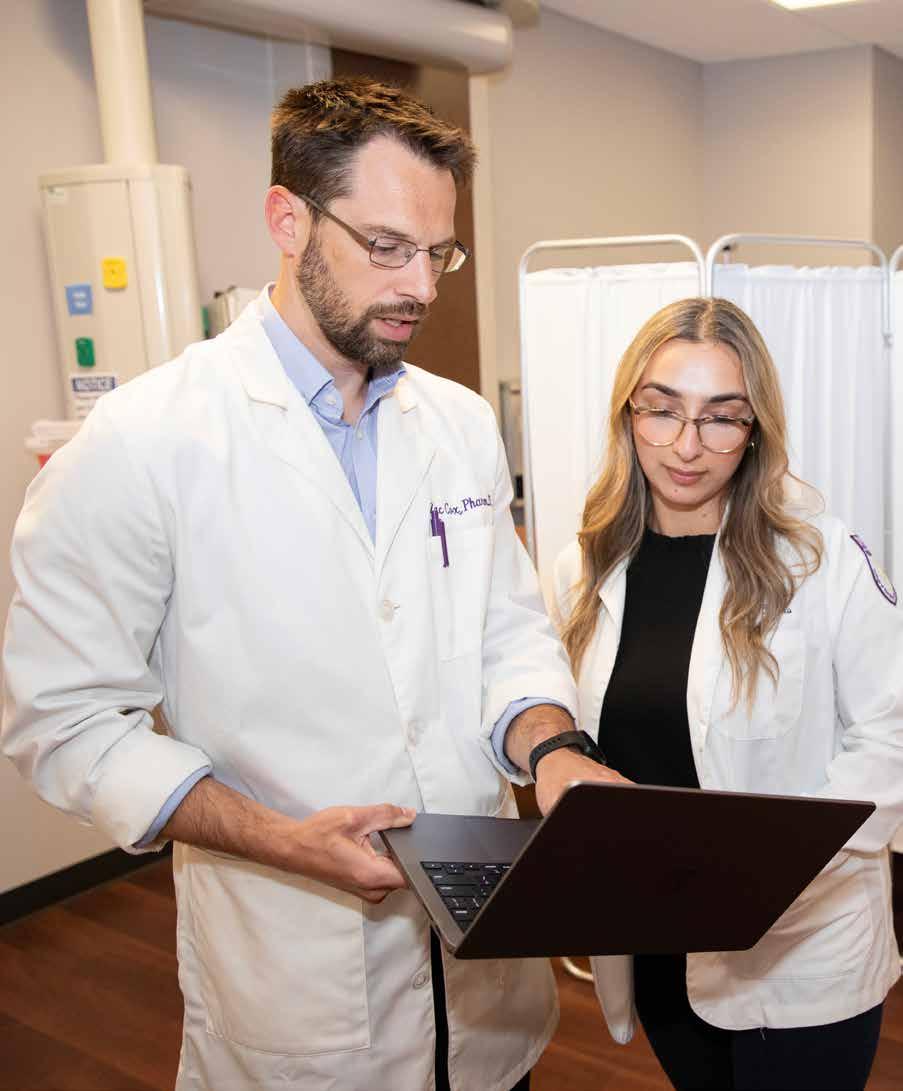
Pharmacy Professor Zachary Cox works to change the future of cardiac care for patients around the world.
Even at the start of his career,
Dr. Zachary Cox was a big thinker.
He knew he was good at science and math, and he knew he wanted to help people. But Cox was thinking bigger than that. He wanted to help people on an international scale.
In summer 2023, he got his biggest chance yet to achieve that goal.
Cox, who holds a dual role as a professor in the Department of Pharmacy Practice and as an adjunct professor at Vanderbilt University School of Medicine, was selected to present the results of his latest clinical trial of the drug dapagliflozin at the European Society of Cardiology (ESC) Congress held in Amsterdam.
The results of Cox’s $1.8 million DICTATE-AHF trial, funded by AstraZeneca, were presented at one of only nine special hotline sessions at the annual gathering of more than 30,000 live participants, mainly cardiologists.
The practice-changing significance of those results, said Cox, are underscored by the fact that pharmacists have rarely been selected to present at the ECS Congress. In addition, the hotline sessions are generally reserved for late-breaking news of recently completed trials with results worthy of sharing with the world, he said. The hotlines are generally the largest and the most well-attended sessions, presenting the most cutting-edge information.
Cox’s drug trial, carried out from 2020 to 2023 at Vanderbilt, “has the potential to impact patient care on an international level by demonstrating the efficacy and safety of the drug dapagliflozin in acute heart failure,” he said.
But it was all in a day’s work for Cox, who began his academic career at Lipscomb in 2009. Since then, his main focus of research has been exploring various drug therapies to reduce diuretic resistance (the build-up of fluid and sodium in the body) in hospitalized acute heart failure patients.
His research goes in tandem with his work at Vanderbilt on an interprofessional medical team that cares for patients but also teaches student pharmacists and
medical students at the hospital. Cox works with physicians, case managers and nurses to formulate the medical therapy for heart failure patients.
Lipscomb’s fourth-year student pharmacists have the opportunity to carry out their advanced pharmacy practice experiences (APPEs) at Vanderbilt, working directly under Cox. Through his university appointment, Cox is able to keep up on the latest drug research and to apply it to both patient care and teaching at the hospital.
He works with students each year in an elective focused on how to conduct clinical research. Students are able to observe Cox’s interactions with patients, how he explains the research study and usually explore their own research question that relates to Cox’s ongoing clinical trial of the moment.
His clinical investigations prior to the dapagliflozin trial, had already garnered national and international attention in print and at the ESC. In May 2019, Cox was invited to present his research on “Diuretic Strategies for Loop Diuretic Resistance in Acute Heart Failure: The 3T Trial,” at the ESC Congress in Athens, Greece.
In addition, he is published in the Journal of the American College of Cardiology: Heart Failure with “Diuretic Strategies for Loop Diuretic Resistance in Acute Heart Failure: The 3T trial” and in the Journal of the American College of Cardiology as a co-author of a review of diuretics in heart failure. These journals are the top journals for heart failure research in the world, Cox said.
Cox has worked with Yale University’s Dr. Jeff Testani on 13 published articles exploring various drug therapies, and these works have been referenced in the ESC’s and the American College of Cardiology’s international guidelines for heart failure treatment.
His published research includes “Compensatory Postdiuretic Renal Sodium Reabsorption is not a Dominant Mechanism of Diuretic Resistance in Acute Heart Failure,” in the European Heart Journal in 2021, and he co-authored a book chapter in Cardiorenal Syndrome in Heart Failure on best practices for overcoming diuretic resistance.
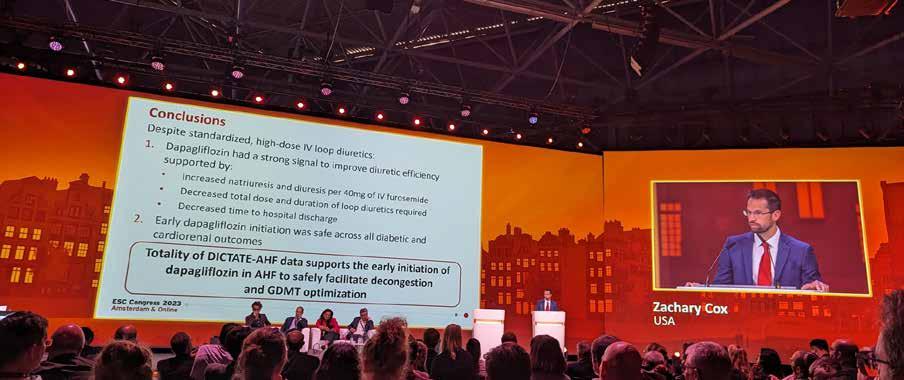
Starting in 2020, Cox was the coinvestigator of the DICTATE-AHF trial along with Vanderbilt’s Dr. JoAnn Lindenfeld. The multi-center study titled, “A Randomized, Open-Label Study of Dapagliflozin in Patients with or Without Type 2 Diabetes
Admitted with Acute Heart Failure,” studied use of dapagliflozin, a drug originally only used for diabetes. This study asked if it would be beneficial and safe to use immediately upon hospitalization for patients diagnosed with acute heart failure.
According to Cox’ presentation at ESC, “exploratory analyses indicated that dapagliflozin improved cardiac decongestion and led to earlier hospital discharge,” and “early dapagliflozin initiation did not worsen any pre-specified safety outcomes, indicating dapagliflozin can be safely started upon hospital admission to rapidly optimize guideline directed medical therapy.”
“This study is important in that it can embolden physicians to safely initiate key medication early in the hospital stay and then continue that chronically for patients with heart failure,” said Cox at the press conference immediately after his ESC Congress presentation.
Even as a teen, Cox shadowed a pharmacist in his hometown of Manchester, Tennessee, and worked as a pharmacy technician at Walmart one summer. He
attended the University of Tennessee at Chattanooga because it had a strong chemistry program and earned his Pharm.D. at the University of Tennessee Health Science Center College of Pharmacy in 2008.
With an early interest in research, Cox took plenty of science electives and even volunteered as a human subject in one research study. But it wasn’t until his pharmacy practice residency at Vanderbilt University Medical Center that he was able to be involved in the kind of research he was really interested in— clinical trials. His passion was evidence-based medicine: using evidence to make a medical decision, he said.
“That is the foundation of medicine. It’s what took us from the dark ages to our modern form of health care. I wanted to be a part of that,” said Cox. “When you can impact future decision-making, you can have a greater impact on the future, nationally and internationally.”
In 2022, he started work on a five-year, NIH-funded trial at Vanderbilt and the Nashville Veterans Association to monitor and dose diuretics in hospitalized patients with heart failure.
In addition, he has pioneered the inhaled form of the drug milrinone, of which he is co-inventor and co-principal investigator with Dr. Nick Haglund. Milrinone is normally administered through IV, so creating an
inhaled form of the drug reduces the risk of infection and increases the quality of life for patients, according to Cox.
His work surrounding the need for the alternative delivery methods of this drug was praised by Cleveland Clinic cardiologists in an editorial in the Journal of Cardiac Failure
Other research findings by Cox have been praised by Duke University cardiologists.
At any one point in time, Cox carries out around 10 clinical trials as either the principal investigator or a consultant.
“Everything that we are doing in these investigations is novel,” said Cox. “We know one-third of patients who leave the hospital are not fully decongested. One reason is that they are resistant to the class of medications that we use. The risk of that patient dying in the next year is really high. So we are demonstrating that different classes of medications can help with the decongestion and thus produce less chance of death in chronic heart failure patients.”

Interested in joining Cox’s collaborations to magnify the power of new treatments for acute heart failure? Scan the code to read more and contact zac.cox@lipscomb. edu to become involved.
This summer, Dr. Susan Turner Haynes, professor in the Department of History, Politics and Philosophy, has seen the final outcome of a fouryear scholarly collaboration between herself and her Lipscomb students hit bookshelves.
Faith in Foreign Aid: Religious Organizations’ Engagement with USAID , a pioneering work that explores the relationship in practice between religious organizations and the United States Agency for International Development (USAID), released in July (See more on the book on page 26).
“This book would not have been possible without the diligent involvement of my students from the outset,” Haynes said, and adds, “The empirical puzzle would not have come to light without their early interest and work.”
From 2018 to 2022, Haynes worked with 38 undergraduates who took on substantial roles, some akin to that of graduate assistants. They coded two decades of government data, crafted an original survey that garnered responses from 400 organizations and conducted numerous interviews. Their findings brought to light common misperceptions about the separation of church and state and fears that religious missions might be compromised when accepting government aid, said Haynes.
Over the course of their work, Haynes’s students not only gained invaluable research experience but also developed hard skills in data management and Excel, positioning them strongly for the workforce and graduate school.
Carrie Cowart-Johnson (BA ’19, MBA ’20), Jake Guerrero (BA ’18) and Payman Beduhe (BA ’19), began working on the pilot project in the summer of 2018 and continued through their senior years. Three students served as research assistants at various points: Konnor Gottfred (BA ’22), Antonina Lucido (BA ’22) and Lauren Bailey (BA ’24).
Haynes said, “I hope they feel pride in their contributions. Their work was essential to the success of this project.”
A 2023 museum exhibit at the James K. Polk Home and Museum in Columbia, Tennessee, visited by more than 5,000 people and curated by Lipscomb history faculty Dr. Tim Johnson, was awarded a 2023 Tennessee Association of Museums Award of Excellence.
The exhibit, “Shaping A Nation: Tennessee Volunteers & the Mexican-American War,” ran from August 2022 until October 2023 and was developed by both Johnson, Lipscomb’s Elizabeth Gentry Brown Chair in History and a nationally known expert on the MexicanAmerican War, and alumna Kate Holt Gunn (BA ’20), who now works as the curator of collections at the Polk home.
Gunn said that knowing her former professor and premier war historian was just down the road in Nashville definitely played a role in choosing to highlight the Mexican-American War as the museum’s first exhibit since the Covid-19 pandemic.
Together Gunn and Johnson collected artifacts from state organizations and private collectors for the exhibit, funded by the Tennessee Wars Commission and the Tennessee Historical Commission. The 20-30 artifacts in the exhibit included documents, weaponry, letters, daguerreotypes and a war medal.
Much of Johnson’s work was writing descriptions of each artifact and creating a 30-page narrative on the people involved and the major battles for the Polk home staff.
Interested in partnering with Lipscomb’s Department of History, Politics and Philosophy? Scan the code to read more and contact tim.johnson@lipscomb.edu to become involved.
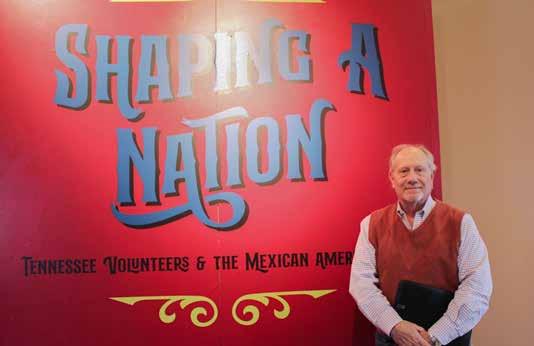
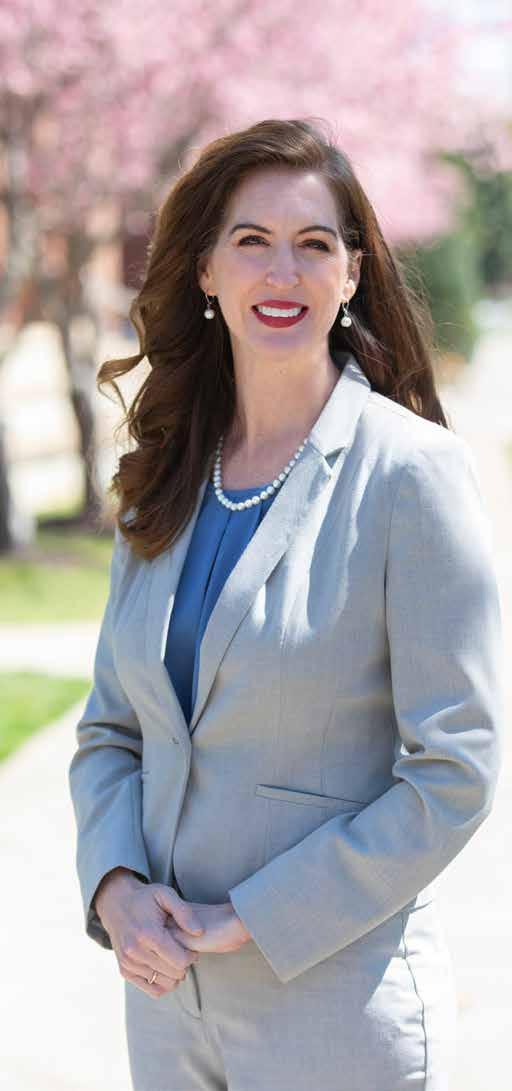
Emily Mofield is making her mark in education with award-winning books highlighting strategies to educate gifted students more effectively.
Dr. Emily Mofield hates to see a good gift go to waste.
Since falling in love with gifted education while teaching in Tennessee’s Sumner County in 2001, she has made it her mission to ensure that no student goes unchallenged in the classroom.
“I believe that we are being good stewards when we help other people grow their gifts and talents for God’s glory,” said Mofield, Lipscomb’s co-director for its gifted and advanced academics graduate program. “All learning should be joyful.”
In addition to teaching in Lipscomb’s Doctorate of Education program and serving in roles with the National Association for Gifted Children (NAGC), the nation’s leading organization focused on the needs of gifted and talented children, one of the primary ways she is getting her message out is through books, 13 in all, including her most recent Coaching in Gifted Education: Building Capacity to Catalyze Change, co-authored with Dr. Vicki Phelps.
Mofield keeps writing, and people keep listening. Two of her books are considered bestsellers within the gifted education field. Collaboration, Coteaching and Coaching in Gifted Education: Sharing Strategies to Support Gifted Learners, also co-authored with Phelps, won the NAGC Book of the Year in the Practitioner category and is currently being translated into Chinese.
In 2022, her article “Benefits and Barriers to Collaboration and Co-Teaching: Examining Perspectives of Gifted Education Teachers and General Education Teachers” in the journal Gifted Child Today was the most downloaded article by more
than 7,700 hits in 2022 and by more than 5,300 hits in 2023.
Mofield’s expertise in teaching gifted education and in effective collaboration among teachers to provide gifted education has peaked at a critical moment in the education world, said Mofield.
Unlike in years past, when gifted students would primarily be served in settings outside the regular classroom for separate instruction, current education trends have increasingly recommended a continuum of services where gifted students receive differentiated instruction in the regular classroom. However, differentiation is easier said than done.
Many school districts are finding they aren’t sure exactly how to make an inclusive model effective. In addition, there isn’t much research on how that collaboration should actually work to develop and carry out effective gifted education methods, she said.
“All teachers teach gifted students. They aren’t just gifted on Tuesdays and Thursdays. ‘They are gifted all day and every day’ is really the mantra of my academic work.”
Mofield has been researching and developing methods of gifted education since 2011. Her works provide guidance on making these multi-tier system models of student support effective through collaboration with a gifted education teacher.
“The field of gifted education has begun to see its role through a talent development lens, asking how can we go into the classrooms and expose more students to high-level learning strategies and see how they respond? In that way we are providing opportunities to elevate the learning of all students,” said Mofield.
with Vanderbilt’s Programs for Talented Youth, where she developed gifted education curriculum units with Dr. Tamra Stambaugh, now at Whitworth University. From 2014 to 2018, she developed professional development for gifted education teachers and others regarding curriculum, instructional design and strategies for Sumner County Schools.
Mofield’s 2022 book, A Teacher’s Guide to Curriculum Design for Gifted and Advanced Students, written in collaboration with Stambaugh, focuses on methods to carry out this “talent development” approach to gifted
and knowledge about effective coaching and collaboration has increased, said Mofield.
“It is very important for administrators to value and communicate collaboration,” said Mofield. “Collaboration is effective when there is a common framework among the collaborators, when the partners are welcoming and willing to work with you.”
Mofield’s latest projects include a guidebook for teachers, written by her and co-author Dr. Chris Weber of the University of North Florida, and published by NAGC. The LEAP Guidebook: Curriculum Design for Gifted Students is a teacher-friendly resource also accompanied by online modules available to teachers for professional development.
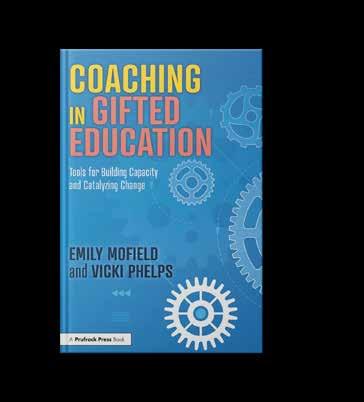
With more than 20 years experience in the classroom, in education programs and professional development, she knows whereof she speaks. Mofield began teaching gifted education through a waiver, basically to have a local job, but the experience changed her life trajectory. After earning her master’s in special education at Vanderbilt University, she returned to the classroom as a gifted education teacher.
After completing her doctorate from Tennessee State University she began working
In 2018 she wrote Teaching Tenacity and a Drive for Excellence: Lessons for Social-Emotional Learning with Lipscomb’s Dr. Megan ParkerPeters, associate dean and Mofield’s co-director of the gifted education program, which won the pair a 2019 Legacy Book Award from the Texas Association for the Gifted and Talented.
Since 2020, much of her work has focused on coaching methods for gifted education teachers to use in collaboration with their fellow teachers. As more schools begin implementing the collaborative approach to educating gifted students, the demand for guidance
Mofield’s passion for developing talent in each and every student rubs off on her Lipscomb students. One such student, Emily Graves, won NAGC’s national 2024 Curriculum Studies Award for her unit for fourth-graders called “Changing the World through Changing Communities.”
Lipscomb doctoral student, Chelsea , is pursuing her research about how to support teacher collaboration as a means to identify students with high-potential from underrepresented groups. England and Mofield have presented her developing research at NAGC and the World Council for Gifted Children conferences.
In addition, many of the strategies she included in her most popular book, Vertical Differentiation for Gifted, Advanced and HighPotential Students: 25 Strategies to Stretch Student Thinking, were actually field tested by her Lipscomb students in their class assignments and research projects.
“All students deserve to learn something new every day. Many gifted students go through school friction-free and do not have opportunities to be challenged academically,” said Mofield. “My passion comes from seeing students come to a better understanding of themselves, their strengths and their potential as they interact with more challenging curriculum.
“I desire for students to understand what’s meaningful to them and to chase that passionately.”
Lipscomb University faculty were busy putting pen to paper in the 2023-24 school year, exploring topics such as the intersection of faith and foreign aid, personal spiritual development, travel in the Holy Lands, military history and healthy media usage. These books by Lipscomb faculty are now, or soon will be, available online for purchase.
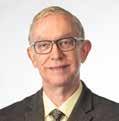
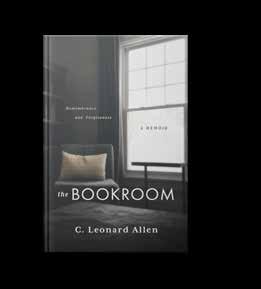
The Bookroom: Remembrance and Forgiveness–A
Dr. C. Leonard Allen (Lipscomb Dean of the College of Bible & Ministry) Leafwood Publishers, 2024
Noted theologian Leonard Allen’s memoir begins at age eight in his father’s bookroom—and with an emerging cluster of questions about the faith he inherited. The search for answers led him on a long journey, including a harrowing desert season, then a season of newness he had not imagined.
The characters in this story are easy to relate to–the humor, the joy and the grief. Readers will get glimpses into the rich texture of their lives—the power of memory, the struggles with selfhood, the need for forgiveness and the surprises of grace.
Randy Harris wrote: “Leonard Allen’s moving memoir weaves together personal experience, theological reflection and spiritual pilgrimage… It’s a splendid recounting of his journey and a welcome companion on our journeys. It makes for deeply engaging reading.”
Allen has taught theology, ethics and philosophy at the graduate and undergraduate level for more than 20 years. He has lectured widely on college campuses and in churches over the past 40 years on biblical, historical and theological themes.
Allen is the author, co-author or editor of 14 books, including In the Great Stream: Imagining Churches of Christ in the Christian Tradition; Poured Out: The Spirit of God Empowering the Mission of God; The Cruciform Church: Becoming a Cross-Shaped People in a Secular World; Distant Voices: Discovering a Forgotten Past for a Changing Church; and Things Unseen: Churches of Christ in (and After) the Modern Age


Dr. Susan Turner Haynes (Associate Professor in Political Science) Routledge, 2024
The United States contributes more foreign aid than any other nation, and it is often recognized as a leader in engaging religious organizations in aid delivery. Faith in Foreign Aid is the first book to closely examine how the relationship between religious organizations and USAID plays out in practice.
Relying on financial data collected by more than three dozen Lipscomb undergraduate students, Faith in Foreign Aid traces faith-based funding patterns in U.S. foreign aid from 2001-2021. It also relies upon a survey of over 400 humanitarian organizations and interviews with over 40 religious organizations to highlight the voices and experiences of faith-based organizations that have relied exclusively on private funding and those that have received grants from the U.S. government.
Susan Haynes’ research provides new empirical evidence that can help inform and shape USAID’s new Strategic Religious Engagement Policy.
Haynes is also the author of Chinese Nuclear Proliferation: How Global Politics Is Transforming China’s Weapons Buildup and Modernization, which explores why China, the only nuclear weapon state recognized under the Nuclear Nonproliferation Treaty, continues to pursue advancements to its nuclear force.



Bible Land Adventures: The Essential
Dr. W Scott Sager (Vice President for Spiritual Development and Church Services)
Marshal Press, 2023
Scott Sager, a faculty member in the College of Bible & Ministry, first walked the old city of Jerusalem as a student more than 30 years ago. Now, he leads Lipscomb students to the Holy Lands to help them grow as disciples.
Traveling to Israel, Palestine, Jordan or Sinai is not a vacation, he says, it’s a pilgrimage. Time in the Holy Lands teaches serious disciples how to read the Bible with their feet, their hands and their hearts.
Sager draws on insights from seasoned guides and archaeologists to provide all the essential details at each site as well as the back stories every disciple needs to get the most out of their visit. Filled with maps, charts and archaeological images, the travel guide gives readers tools unavailable at most sites. In addition, key Scripture references, space for personal reflections and notes on special site features enable users to make this book a treasured keepsake combining site details with personal experiences, insights and meditations.
Sager’s other books include Jesus in Isolation: Lazarus, Viruses and Us and Disciple Making: The Core Mission of the Church.
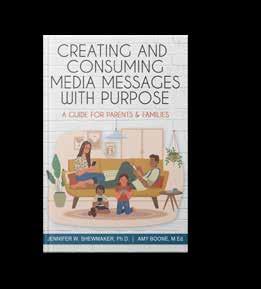
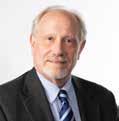
Dr. Jennifer Shewmaker (Provost) and Amy Boone
Gifted Unlimited, 2024
Media messages are prevalent and powerful, and increased media exposure means children must learn to be purposeful, healthy consumers and creators of media.
This book benefits parents and families with an introduction to identity development and media’s effects on it, combined with topics for meaningful conversation and activities to reinforce purposeful use of media.
Grounded in research and with lessons focused on different aspects of media, this work provides families with a guide for developing and supporting lifelong skills around active media consumption and creation.
Jennifer Shewmaker is a professor of psychology and a nationally certified school psychologist. She is a founding board member of the Brave Girls Alliance, an international partnership of parents, professionals and small business owners advocating for healthy, empowering media for children.
Her previous book, Sexualized Media Messages and Our Children: Teaching Kids to Be Smart Critics and Consumers, takes a look at children’s consumption of sexualized media messages while providing readers with strategies for abating their influence.

Dr. Timothy D. Johnson (Elizabeth Gentry Brown Chair in History)
LSU Press, 2024
Tim Johnson’s eighth book focusing on military history is a collection of 12 essays by noted Civil War scholars examining the lessons 12 generals learned in the Mexican-American War that influenced their later Civil War decision-making. (See more about Johnson on page 23.)
Johnson solicited and edited the essays. The contributing historians are from the University of Virginia, University of North Carolina, the U.S. Army Command and General Staff College, the U.S. Naval Academy and other research institutions. Essay topics discuss Ulysses S. Grant, Joseph Hooker, Robert E. Lee, Thomas “Stonewall” Jackson and James Longstreet, among others.
Johnson, who wrote the introduction, proposes that the earlier war, fought from 1846 to 1848, was a laboratory of experiential learning which helped mold leadership characteristics in the areas of strategy, tactics, logistics and interpersonal relationships played out during the Civil War.
The publication is the first scholarly effort to bridge the two wars, and it is part of Louisiana State University’s “Conflicting Worlds: New Dimensions of the American Civil War” series.
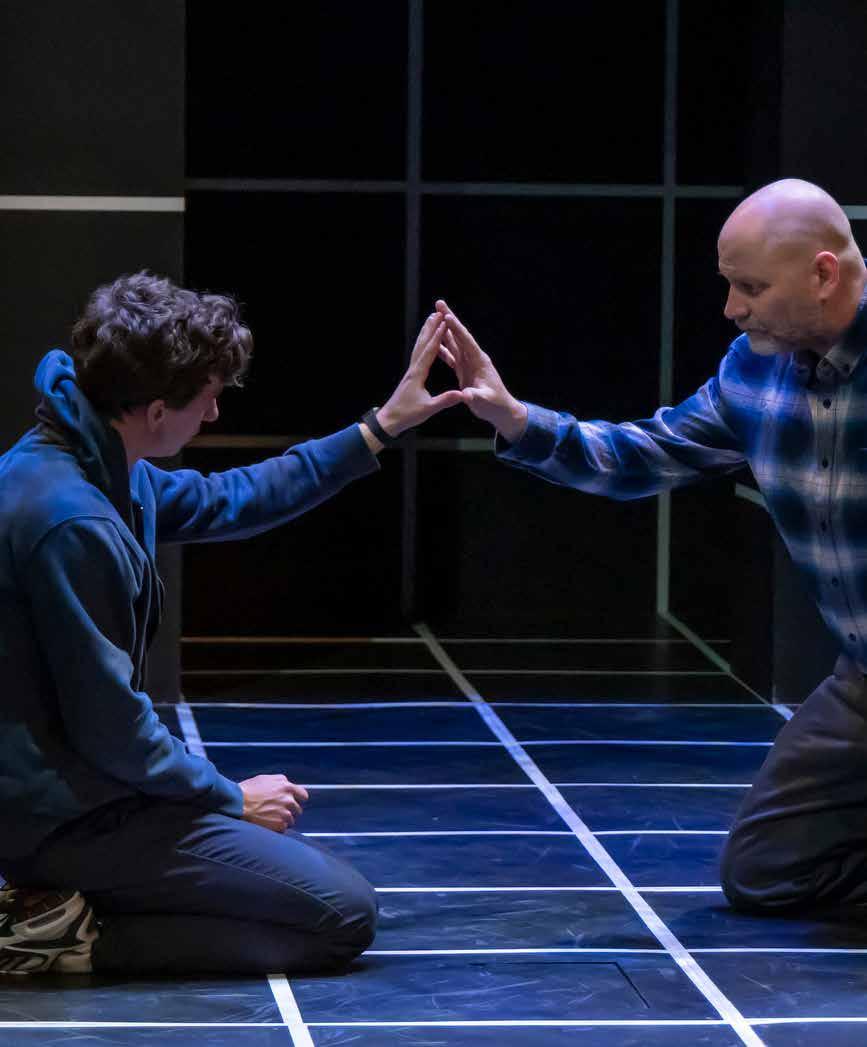

Lipscomb artists’ creativity and academic scholarship fuel Nashville’s identity as a theatrically artistic city.

ashville may have earned its “Music City” moniker due to the rise of Country music, but there’s no doubt that the South’s “It City” also has a thriving arts scene, from classical music to contemporary art, from opera to children’s theater.
When Nashville’s premier cultural organizations begin to hatch a new idea for their next production, it is more often than not, that an expert from Lipscomb’s George Shinn College of Entertainment & the Arts will be called upon.
Lipscomb’s arts faculty bring to these local community organizations a wealth of professional experience, uncommon professionalism, creativity and an approach to any concept informed by years of research and scholarship.
This past spring brought an unusually unique collaboration as Lipscomb partnered with the Nashville Shakespeare Festival to stage Shakespeare’s Hamlet, bringing thousands of Nashville students to campus to see the Bard’s most famous play.
Nat McIntyre, assistant professor of theatre, directed a version of the play that combined modern music and a mashup of modern and classical styles for costumes and sets to bring to life a creative vision all his own. McIntyre has been on the Lipscomb faculty for only six years, but in that time he has had an impact on the city’s culture far beyond Lipscomb’s on-campus stages.
He most recently acted in Nashville Repertory Theatre’s The Curious Incident of the Dog in the Night-Time and in Rabbit Room Theatre’s The Hiding Place. Prior to that, he directed A Streetcar Named Desire for Nashville
Repertory and Henry V and Macbeth for Nashville Shakespeare Festival.
Every decision made to produce a work of art is based on an understanding of the work’s cultural context in history, so cutting your artistic teeth on Shakespeare is particularly valuable for future artists, said McIntyre, who earned his MFA from The Old Globe Theatre at the University of San Diego, California.
“I think when you learn classical, it is the basis for everything else in theater,” he said. “You learn how to take any theatrical work and make it relevant to any audience. It teaches you how to find the theme that rings true today and to find productions that speak to a common audience.”
At the beginning of any production, McIntyre begins by researching the work, especially the language. “I start with the words,” he said. “I read the original version as Shakespeare first wrote it. That can often help with the correct pronunciation, the rhythm of the piece and themes.
“You think about the time the work was written and research what was going on at that time in the world. I also investigated past productions of Hamlet and pinpointed what resonated about those versions,” he said.
June Kingsbury, Lipscomb’s costume designer and costume shop manager, was given a challenge for Hamlet to mix two time periods: 15th century Danish medieval and modern. She tackled it by hitting the history books to research patterns of medieval period garments and combined those shapes with modern fabrics to look something akin to Project Runway’s weirder looks, she said.

Kingsbury has no lack of experience creating wholly new looks for a unique creative vision. She has been costuming Nashville theater productions since 2000, including a production of Cinderella for Nashville Opera that had a “beach blanket bingo” theme and a production of Rigoletto with a film noire black and white theme. Over the past 10 years for the Nashville Shakespeare Festival, she has designed birdlike fashion for Love’s Labour’s Lost, pan-Asian costumes for Macbeth and World War II-themed costumes for Much Ado About Nothing
She’s collected many art and fashion history books over the years to help with inspiration and authenticity. Kingsbury also watches period dramas for ideas. “You have to think about how fashion relates to the politics and society of the time. Having a broad understanding of history and culture is very important,” she said.

Adding to her eight-year history of directing various works for Nashville Repertory and Studio Tenn Theatre Company, Beki Baker, associate professor and chair of Lipscomb’s theatre department, directed 9 to 5 for Nashville Repertory in fall 2023 and Driving Miss Daisy for Studio Tenn this past spring.
“The research that I do influences my teaching, directing and my one-onone work with students,” said Baker. Working in Nashville’s professional theater scene allows her to remain up to date in her field and bring that knowledge back to students, she said.
“The main research is the time period. You must understand different aspects of the show: the playwright’s intent, the use of music, the story and the physical layout,” said Baker.
For her work on 9 to 5, a musical based on the cult classic film and
addressing the massive cultural shifts for working women in the 1970s, Baker studied the status of women at that time, learning that women made up 50% of the workforce but were paid 60% less than men. Even today, women are paid only 80 cents for every dollar earned by men, and four in 10 women report gender discrimination in the workforce, she found in her research.
For Driving Miss Daisy, a play that tackles racism and antisemitism in the 1940s through the ’70s, Baker assigned a student, Justice Orrand, as her director’s assistant. Orrand put together a 20-page dramaturgical packet on related themes and events in the time period such as Jewish culture in Atlanta, the civil rights movement and Jim Crow laws.
“I’m a very thorough, organized and efficient director,” said Baker. “That way when I come into the process, I
“I THINK WHEN YOU LEARN CLASSICAL, IT IS THE BASIS FOR EVERYTHING ELSE IN THEATER. YOU LEARN HOW TO TAKE ANY THEATRICAL WORK AND MAKE IT RELEVANT TO ANY AUDIENCE.” —NAT MCINTYRE
can be highly collaborative. I believe the product is better by all working together. Lipscomb’s artists care about the interpersonal experience. We are not means-to-an-end kind of people.”
Christopher Bailey, an associate professor of musical theatre and voice, has worked as musical director for Nashville Children’s Theatre off and on for six years. His most thoroughly researched production with the troupe came this past spring, he said. The Gingerbread Kid was fully developed by the theatre and world premiered on its stage in January.
As it was a completely new show, the team was able to workshop the production in the summer of 2023, a rarity in today’s theater industry.
“It was a three-day process, where we learned the show and did a read- and sing-through for an invited audience on the third day. Then we were able to go back to the writers’ room and discuss what worked and what didn’t and how we can make it better,” said Bailey.
The team continued to re-work aspects of the show, about the magical child of a baking couple, throughout the fall of 2023, and one of the show’s songs, “Life Is Sweet,” was selected to perform at the Theatre for Young AudiencesUSA’s national conference.
A music director gets the final say of the score and voicings and serves as a go-between for the director and the cast, said Bailey. Depending on the soundscape of the show, the musical director could be directing an orchestra or a smaller band or could serve as a track engineer, mixing recorded tracks with live performers.
The Gingerbread Kid is a pop music show, but there are not many pop musicals in children’s theater, said Bailey, so he looked to recordings of pop music with strong background vocal arrangements, and he borrowed the style seen in Sara Bareilles’ Waitress, a Broadway show that used her pop music vocal style.
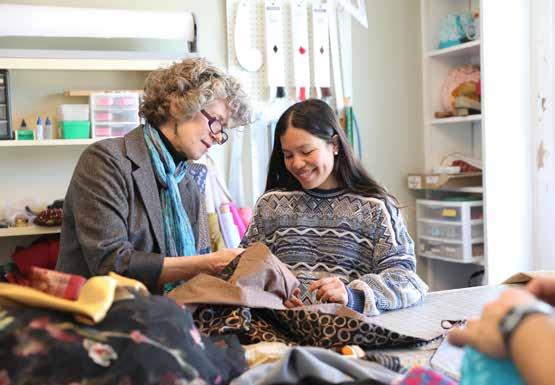
He also brought his long-time experience in children’s theater to bear, knowing the sound capabilities of the theater space, the size of the cast and the number of costume changes all make a difference in how the singing sounds during the show. He also watches recordings of musicals to see how the cast and director handle demanding, fast-paced scores like that of Hamilton.
“It’s really important to me to stay current in creative downloading. You must go see shows; you must listen to things; you must look at things at the top of the industry,” he said. “Ultimately, all of us in the arts want to make good work. We can do that at any level, you just have to have forethought on how to make it happen.”
Read more about the theatre department’s artistic work in Nashville at lipscomb.edu/theatrenashville.
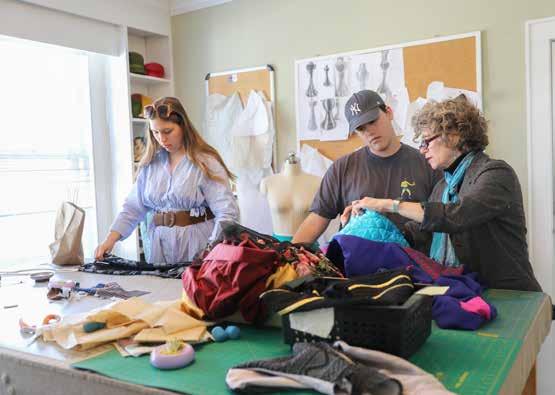

Discovery and application meet at the intersection of the scientific method and spirituality.
At Lipscomb, faith is not kept within a silo, and research is not excluded from questions of spirituality. While faith may not fall within quantitative measurements, its impact on society, individual people and their daily lives in the world can be measured, analyzed and explored. During the 2023-2024 school year, faculty from various colleges took on questions of spirituality through the scientific method, working to discover new ways to apply faith-based living and interacting in business, science, higher education, within church congregations and within the Academy.
The intersection of faith and science
Dr. Josh A. Owens (BS, ’16), assistant professor and undergraduate research coordinator in biology, was awarded a grant from the Lilly Network of Church-Related Colleges and Universities in 2023 to lead a three-university initiative to address the perception among GenZ students that Christianity is inherently at odds with scientific principles.
The grant supports the efforts of Owens, Dr. John Lewis (A, ’00), the McClure Professor of Faith and Science, and Josh Reeves, director of the Samford Center for Science and Religion, to create a May workshop with faculty participants
from the sciences, theology and administration from Lipscomb, Samford and Belmont University.
The primary goal of the workshop was to produce a survey to analyze their students’ views on faith and science. The results will guide the faculty in designing curriculum modules to better discuss the relationship of science with Christian faith and biblical truth.
“We want to remove any perceived stumbling blocks for students who are capable of making an impact in a scientific field but fear they must abandon their faith in order to engage in relevant academic discussions,” said Owens.
The survey, expected to be distributed in freshman biology and STEM courses at the universities this coming fall, is intended to discover the source of that attitude among current students, said Lewis. Is it teachers, youth ministers or their home life shaping this view among youth, he asks. It’s an open question in need of research, he said. “We must figure out where that conflict is coming from, and then we can plan workshops for the target audience,” he said.
The intersection of faith and higher education
When it comes to visioning for the future and understanding how the typical student may change in the future, America’s 12 regionally accredited Church of Christ universities have been utilizing quantitative data from Lipscomb’s Associate Provost for Research and Graduate Studies Dr. Trace Hebert since 2011.
That’s the year that Hebert began providing the presidents of these institutions (Church of Christ-affiliated universities with traditional residential campuses), annual data on the faith backgrounds of students in each institution’s freshman class.
The annual enrollment reports began at a time when the university
presidents were concerned about slipping enrollments among traditionalage students with a Church of Christ heritage. They needed hard data, and the data proved their concerns justified. Hebert’s 2023 report showed a continuation of a steady decline, from 4,411 Church of Christ-affiliated freshmen enrolled for the first time in the year 2000 to 1,489 affiliated freshmen enrolled in 2023, a decrease of 66.2%.
At the same time, thanks to nontraditional programs such as online, graduate and adult education programs as well as students from backgrounds other than the Churches of Christ, total enrollment of students from any and all backgrounds has increased by 1,859 students since 2011.
The university presidents use the data in reports to their governing boards. His data has been published a number of times in the Journal of Faith and the Academy, and he has been called on by the Christian Chronicle to discuss his research.
“This data has been strategically helpful to the institutions to see that they are not going to be able to rely on the traditional Church of Christ students to maintain their enrollments in the future,” said Hebert. “They understand that they must diversify, while still recruiting students interested in Christian higher education, even if those students are from other faith backgrounds.”
The intersection of faith and business
Dr. Wlamir Xavier was first a scholar before he became a Christian. So today, as a professor of finance, he enjoys bringing his scholarly approach to issues of faith, especially issues within his chosen field of expertise—business strategy.
So it’s no surprise he was one of only three scholars worldwide selected for the 2023 cohort of the Bill Pollard Faith & Business Research Fellowship, sponsored by the Seattle Pacific University Center of Faith & Business. The fellowship included a one-week residency in Seattle, use of the faith and work library at the university and a cohort-based research collaboration on a project addressing business and faith interaction.
Xavier’s fellowship research is exploring how, if at all, the abandonment of Christian principles and purpose by ServiceMaster’s top executives and board members may have affected the company’s eventual decline. The fellowship’s namesake, William Pollard, is an author on leadership and a former chairman and CEO of ServiceMaster.
“ServiceMaster was founded almost 100 years ago on strong faith-based values. The company’s main value was to ‘Honor God and His creation,’” said Xavier.
But as the company got bigger and the ownership structure changed, the interests of investors became the

“THE
MY PASSION FOR THE
CHURCH AND MY LOVE FOR OUR ELDERS AS WELL.”
priority and the company took a turn in the 1990s. In 1999, the first CEO who had not been previously embedded within the company culture was appointed, and Xavier’s hypothesis is that event began an evolution that led to the decline of the company.
The intersection of faith and the congregation
While scholarly work in spiritual issues can take place in any sphere of life, questions relating to today’s church congregations are particularly important at this point in history, said Dr. Carlus Gupton (BA ’82), director of the Doctor of Ministry program.
Church leaders are today facing ever greater cultural, economic, emotional and strategic challenges, and many of the common models for governance of organizations lack theological direction and spiritual vitality, he said.
The Doctor of Ministry program teaches strategic congregational leadership for those already practicing such leadership and those who feel they will benefit from the concepts in their chosen profession. With that audience in mind, each of Lipscomb’s doctoral graduates focus their dissertations on an area of research to solve a problem, enhance their day-to-day work or help renew the mission of those in their chosen sphere of life.
Examples of research from the past two years include: a study of what methods benefit spiritual health of those in prison; the formative impact of a leaders’ retreat among campus ministers in Africa; how shared spiritual practices in families contributes to youth’s spiritual formation; the effectiveness of a spiritual vocation course at Lipscomb for nursing students; and ways the church ministers can overcome burnout.
Dr. Jon Micah Richardson (DMin ’22), a family discipleship minister at
—DR. JON MICAH RICHARDSON
Hendersonville Church of Christ, carried out a research project called, “Exploring the Receptivity to, and the Formative Impact of, Spirit-Empowered Rhythms in the Life of an Eldership.”
During his ministry career so far, Richardson had noticed that many Church of Christ elderships have a focus on the administrative work of the congregation, and thus tend to inadvertently neglect their own spiritual practices as a group. “My research focused on introducing them to practices they could engage in personally and communally that would open them up to the work of the Holy Spirit within their lives as elders,” said Richardson.
His own eldership at Hendersonville agreed to be his research subjects. Richardson designed a daily and weekly spiritual formation guide with weekly themes and articles to stimulate curiosity. Working through the guide took 15 to 30 minutes each day, and then the elders came together for a communal spiritual activity once a week.
The exercises culminated in an on-site retreat where the elders discussed what was important to them and where they wanted to focus as an eldership, having now completed the six weeks of spiritual activities.
“The project reaffirmed my passion for the local church and my love for our elders as well. I want churches to be healthy, and spiritual health is so important to that,” said Richardson.
For the past 16 years, Lipscomb has served as the primary host for the Thomas H. Olbricht Christian Scholars’ Conference (CSC), an annual interdisciplinary gathering intended to facilitate interaction and discussion of theological issues amongst all academic disciplines.
Featuring sessions in the arts, the sciences, business, sociology and the humanities, as well as theological areas, the June conference was held this year at the Lanier Theological Library and Learning Center in Houston Texas, and attended by hundreds of scholars to explore the theme “Hope Amidst Crises: Challenges, Opportunities and Collaborations.”
Reflecting an awareness of global crises while projecting a hopeful vision, the conference addressed contemporary societal concerns through a slate of nationally recognized experts and scholars including:
♦ Dr. N.T. Wright, senior research fellow at Wycliffe Hall, University of Oxford;
♦ Dr. David French (BA ’91), New York Times columnist and Lipscomb’s Turner Family Distinguished Visiting Professor of Public Policy;
♦ Dr. Jonathan Brant, dean for research and culture at Wycliffe Hall, University of Oxford;
♦ Charlie Styles, CEO of the Oxford Centre for Christian Apologetics; and
♦ Dr. Mark Lanier, founder of the Lanier Law Firm and a Lipscomb trustee.
These speakers, and more then 80 other speakers, conveners and coordinators, explored questions surrounding trust of America’s institutions and division in church and academia as a symptom of today’s divisive culture.

Lipscomb’s partnerships with Samford, Belmont and Church of Christ-affiliated universities spark new insights into human faith. Scan the code to read more and contact officeofresearch@lipscomb.edu to become involved.
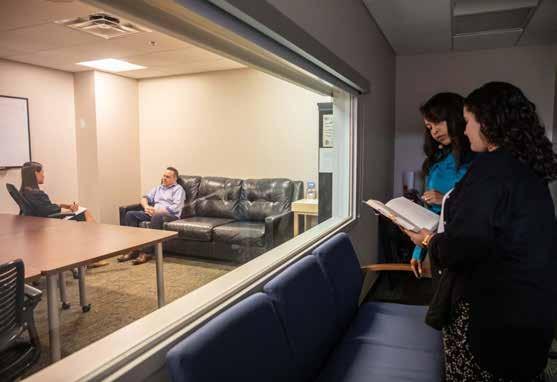
In 2023, Dr. DeAndrea N. Witherspoon Nash, director of Lipscomb’s clinical mental health counseling program and lead faculty for the addiction specialization, was awarded a $1.65 million grant from the Health Resources and Services Administration, an agency of the U.S. Department of Health and Human Services.
The grant funded Witherspoon Nash’s proposal to improve mental health services in Middle Tennessee by training the behavioral health and health care workforce through a new Healthcare Professionals Certificate Training program, providing full tuition for a total of 50 students to complete a graduate certificate in treatment of substance abuse disorders.
The certificate training program will prepare trainees to address the unmet mental health and substance use disorder needs of underserved and vulnerable individuals in comprehensive health centers, with a focus on children, adolescents and the emerging adult population in Middle Tennessee.
The grant has funded the hiring of a faculty member, Assistant Professor Dr. Brooke Foxworthy, and the securing of two consultants in the field to provide instruction in psychopharmacology, current trends and data in the field and supervision of the students’ work with clients.
Unlike Lipscomb’s existing addiction specialization track, the 10 trainees currently enrolled in the certificate program are health care professionals who will present and receive feedback on client/patient cases under the supervision of Foxworthy, the consulting psychiatrist and a dually licensed mental health, alcohol and drug counselor.
The certificate program is designed for counselors, physician assistants, nurse practitioners, nurses and social workers practicing at partnering community mental health and Federally Qualified Health Centers providing co-occurring mental health and substance use disorder treatments for underserved populations.
Learn more about the Healthcare Professionals Certificate Training at lipscomb.edu/hpct.
Through more than 20 years as a New York City police detective and hostage negotiator, Dr. Jeff Thompson learned a lot about the dark side of human nature and how crises come about.
After walking a beat, driving a patrol car, working in the public information office and serving as a hostage negotiator, he came to a conclusion that the average person might not expect: a crucial way to protect the public is to protect the protectors.
During the last stage of his police career, he served as the mental health and wellness coordinator for the NYPD and delved into research on how to promote resilience among not only first responders, but to anyone in the public as well.
Most recently, his research has veered toward the role that awe plays in good mental health and work productivity. In 2023 Thompson’s study “NASA Resilience and Leadership: Examining the Phenomenon of Awe” was published in Frontiers in Psychology His study, which included how NASA’s leadership supports astronauts to prepare them pre-mission, during missions and post-mission, found that “reflecting on awe experiences can support a person finding meaning and purpose in their life, evoke gratitude, increase social connectedness, promote optimism and other resilience skills in the moment.”
Learn more about Thompson at lipscomb.edu/thompson.


Lipscomb funds summer research to advance discovery in family science, robotics, art and faith, youth ministry and theology.
Each year, Lipscomb University awards up to six grants to allow faculty to focus on research and scholarship during the summer. In 2024, five faculty were awarded grants to conduct projects adding to humanity’s knowledge base in personal relationships throughout open adoptions, artificial learning by intelligent robots, the intersection of artistry and faith, effective youth ministry and Black Christianity in America.
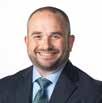
Dr. Shaun Calix
Lead Faculty for Family Science
Qualitative Study of Open Adoptive Family Relationships.
Calix’s summer project involves a qualitative study of relationship dynamics between adoptive parents and birth parents in open adoptions, including factors such as boundary formation and power.
The project, expected to involve interviews of 10-15 each of adoptive parents and birth parents, will deepen scholars’ and practitioners’ understanding of open adoption relationships and how to support them. The intended result of the study is a theoretical model of relationship dynamics between adoptive and birth parents that will serve as part of the basis for future population-level research. Calix’s intended program of research, of which this study is the first, also will contribute to the development of educational programming for adoptive and birth parents in open adoptions.
Calix became interested in this area of research after he and his wife became adoptive parents in 2022; they are in an open adoption with their son’s birth mother. Currently, there are few educational resources available to adoptive families on how to healthily navigate their relationships with birth parents in addition to little research on the topic that would form the evidence-base for such research. Calix hopes to fill both gaps.
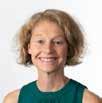
Dr. Jan Harris
Professor of Writing/English and Center for Teaching & Learning Faculty Fellow for Well-Being
Professional Development on Mindfulness, Wonder and Professional Writing
Harris will spend the summer actively studying subjects that frequently arise in her work teaching creative and professional writing and conducting teacher training in Lipscomb’s Center for Teaching and Learning (CTL).
The Mindfulness Center is an accredited nonprofit with in-person and online training and events devoted to the evolution of the standard of health care from one of managing disease to one of fostering health.
Harris plans to use her accredited mindfulness teacher training to expand weekly “reset sessions” held for faculty in the CTL, to refine and develop curriculum for the Mindfulness Minute Breakout Chapel she has been leading since fall 2021 and to establish partnerships to hold other mindfulness events for faculty and students.
In addition, she will attend the Wonder Festival sponsored by the EcoTheo Collective, which is based at Princeton Theological Seminary and publishes the EcoTheo Review (ETR).
“My interest in the intersection of creative work and theology began in college when I was an English major and theology minor,” said Harris. “As a poet and creative writer, my work often engages with questions about wonder, grace and community through an interdisciplinary lens.
“The Wonder Festival will provide me with an opportunity to listen and learn from other creatives and theologians whose works are involved in a similar conversation.”
Finally, to address an increase in students interested in professional writing. Harris will acquire an up-to-date understanding of what skills students would need for professional writing jobs like proofreading and editing and use her knowledge to assess the university’s professional writing courses.

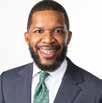

Dr. Aaron Howard
Assistant Professor of Ethics and Reconciliation in the College of Bible & Ministry
Incommensurable Paradigms: The Competing Claims of Black Pietism and Black Liberationism Howard, who holds degrees in ethics and society, theology and biblical studies, education and counseling, and anthropology, is working to become one of the few Black theologian authors of a book-length critique of Black liberation theology and womanism.
His funded research project will entail revising his Ph.D. dissertation into book form to submit for publication.
By using primary sources to identify the central theological beliefs of Black Christianity in America from its inception in slave religion to its development in Black church institutions during the eighteenth through twentieth centuries, Howard’s book will contrast those beliefs with the current philosophy of Black theology/womanism to demonstrate incongruence between these two traditions.
His writing argues that these traditions cannot be harmonized and should remain conceptually and institutionally distinct.
“This book will provide non-Black academicians and laypeople who reject the methods and beliefs of Black liberation theology/womanism with a helpful resource for clearly articulating their views,” said Howard, who served in ministerial leadership for over 25 years.
He now teaches undergraduate and graduate classes in ethics, directs the Lipscomb University Gospel Choir and teaches a class on multicultural worship.
His research interests include the ethics and theology of Martin Luther King Jr., divine command ethics, virtue ethics, emotion and embodiment in worship, and revivalism.

Dr. Juan Rojas
Assistant Professor of Electrical and Computer Engineering
Real-time Robot Policy Learning Acceleration via Iterative Symmetrical Transformation Deployment
Building on a deep bench of experience in intelligent robotics, Rojas’ summer project will relaunch research work Rojas was conducting in his previous posts in China.
He seeks to develop learning algorithms that can be used by robots in near real-time. The goal is to develop a framework allowing robots to learn new deep reinforcement learning (DRL) policies in near-real time as they face new environments that they do not know how to solve.
DRL algorithms are able to take in very large inputs and decide what actions to perform to optimize an objective, thus teaching robots how to carry out real-world tasks in unfamiliar environments.
According to Rojas, DRL has been shown to be very effective for
robots’ manipulation, gripping, locomotion and navigation, but currently most DRL training occurs offline. Once trained the robot is then launched to do a task.
“I hope to enable the quick learning of policies as a robot agent encounters new situations in real time,” said Rojas. “Effectively developing a real-time learning framework would advance the state-ofthe-art in intelligent manipulation.”
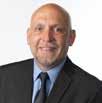
Dr. Walter Surdacki
Professor in the College of Bible & Ministry
Made in the Streets (MITS) Staff Development and Best Practices
Made in the Streets (MITS) is a youth ministry organization with a 27-year successful track record of serving early, middle and late adolescents in Nairobi, Kenya. It is a multi-site residential program with a property to serve currently unhoused teens, a boarding school serving about 130 students and a vocational school which provides job training and job placement.
MITS has earned a great reputation among regional nongovernmental organizations (NGOs), who have often asked MITS leaders about the best practices that have earned them their extremely high success rate.
Surdacki will travel to Nairobi to identify, document and package MIT’s best practices for trainings for other organizations. “The data that I gather will also better train and equip my students who are preparing to serve in youth ministry, particularly those who serve teens who have suffered trauma and abuse,” said Surdacki.
“There is much to be learned in the world of youth ministry from success in other cultures. Sometimes in the U.S., youth ministry seems like an extracurricular activity in which parents enroll their teens,” he said. “American ministries would benefit from different ways to think of the transforming power of the Gospel, as well as what Kenyan Christian community life can teach us about ministry to adolescents.”
These training materials would be designed so that MITS may use them to help train future staff members as well as to partner with outside organizations asking for their wisdom, said Surdacki.

From artificial intelligence to job placement for at-risk youth, Lipscomb faculty can bring valuable expertise to discovery of new knowledge. Scan the code to read more, and if you are interested in partnering with Lipscomb faculty, contact officeofresearch@lipscomb.edu.
Each year, Lipscomb’s faculty members are busy making hundreds of presentations at academic conferences and writing articles published in academic journals, a significant landmark in the career of any academic.
However, many faculty add to that scholarly work by also serving as editors and gatekeepers for academic journals, making their mark on the trajectory of their academic discipline worldwide through their scholarly expertise.
Involvement in producing academic journals is about more than advancing one’s own academic career, say Lipscomb’s faculty. It’s about broadly sharing knowledge to enhance the scientific community and discovery as a whole.
“In any discipline, the idea of the community of scholars is very important and supporting one another in our research endeavors is one way to build that community,” said Dr. Chris Gonzalez, professor and director of Lipscomb’s marriage and family therapy program and editorial board member of the Journal of Marital and Family Therapy.
Part of being a researcher is supporting the research of others, said Dr. Wlamir Xavier, professor of finance and associate editor of two journals: Revista Brasileira de Gestão de Negócios and the Brazilian Administration Review. It is not uncommon for any one issue he works on to feature about 30 articles representing scholarship produced by about 50 universities.
Various faculty on campus are making decisions daily about what articles are included in journals in their fields, who is assigned
to review the works and a recommended approach to revisions and improvements. Editors also frequently attend academic conferences to network with their peers and scope out forthcoming research that would meet the criteria of their journals.
“In technology, we are looking for novelty, relevance and anything that is a significant improvement over the current stateof-the-art, “ said Dr. Juan Rojas, assistant professor of electrical and computer engineering and associate editor for Advanced Robotics and the IEEE Robotics and Automation Letters. “We are always trying to push the field forward and filling gaps in technology or science.”
Lipscomb’s journal editors raise Lipscomb’s stature as a research institution by bringing broader recognition to the faculty and its strengths, said Dr. Andy Borchers, professor of management, co-editor of the Journal of Critical Incidents and publication director of the Christian Business Faculty Association, an organization which publishes two journals.
“When we have faculty who work as editors, it encourages other faculty to become authors, so it helps build a culture of scholarship,” said Borchers. “Faculty members need to have a professional home outside of campus, a place they go year after year to publish, to present papers and to get ideas from others.”
In addition, serving as an editor is a built-in way to have access to the latest research to inform rigorous classroom instruction at Lipscomb, said Dr. Andrew Mauldin, assistant professor of kinesiology and editor for the Journal of Movement and Being.
“There is a huge connection between scholarship and being a good professor,” he said. “In this role, I get to read and absorb a lot of research done by great scholars – best practices in teaching, material to discuss and learning activities to implement in class that help me become a better teacher.”
A selection of faculty serving in editorial roles in 2023-2024:
Dr. Andy Borchers, Professor of Management Co-editor, Journal of Critical Incidents; Publication Director, Journal of Business Integration in Business and Christian Business Academy Review
Dr. Chris Gonzalez, Professor and Director, Marriage and Family Therapy
Editorial Board Member of the Journal of Marital and Family Therapy
Dr. Andrew Mauldin, Assistant Professor of Kinesiology Guest Editor of diversity, equity and inclusion special issue for SCHOLE, The Journal of Leisure Studies: and Editor for the Journal of Movement and Being
Dr. Juan Rojas, Assistant Professor of Electrical and Computer Engineering; Associate Editor, Advanced Robotics and the IEEE Robotics and Automation Letters
Dr. John Smith, Professor of Chemistry Editorial Board Member for Sustainability
Dr. Jenny Snodgrass, Academic Director and Professor of Music Executive Editor for the Journal of Music Theory Pedagogy
Dr. Lesley Tomaszewski, Director of MBA and MHA Editorial Advisory Board for Open Health and for GLOCALITY
Dr. William Turner, Distinguished Professor Guest Editor for special edition of Family Process
Dr. Wlamir Xavier, Professor of Finance
Associate Editor of Revista Brasileira de Gestão de Negócios and the Brazilian Administration Review; Chair of the Editorial Board of The Transnational Journal of Business

From the temples of Egypt to psychopathic traits, from molecules inhibiting fat to the role of hymnals in the 21st century, faculty researchers at the second annual Faculty Research Day in September 2023 shared how they are advancing new knowledge and societal change in today’s world.
The event, held in the George Shinn Center, featured 31 faculty from eight Lipscomb colleges presenting posters or oral presentations on their research projects.
A new feature of the event this year included four faculty making oral presentations: Dr. Lauren White , assistant professor of theology and author of Flesh Made Word: The Protestant Interpretation Problem and an Embodied Hermeneutic; Dr. Andy
Borchers , professor of management, who recently completed a sabbatical as the first visiting faculty at Heritage Christian College in Ghana, Africa; Dr. Ben Blasko , associate professor and director of instrumental studies; and Dr. Kyle Brawner (BS ’12), assistant professor of biology.
“This event is an excellent opportunity to celebrate the scholarly endeavors of our faculty, to network with others who share scholarly interests and to engage in dialogue that further advances research and creativity at our institution,” said Dr. David Holmes , special counsel to the provost on liberal arts and dean of the College of Liberal Arts & Sciences, which sponsors the event.
The Carolyn Wilson Digital Collections, dedicated to supporting and sharing intellectual thought with the academic community beyond our campus, provides free access to Lipscomb’s student and faculty research in:
• Business
• History
• Counseling

• Kinesiology
• Nutrition
• Leadership
• Biology
• Chemistry
• English
• Social Work
In addition, the digital collections include historical archives of:
Lipscomb University
Nashville Christian Institute (1943-1958)
The Confessing Church in 1930s Germany
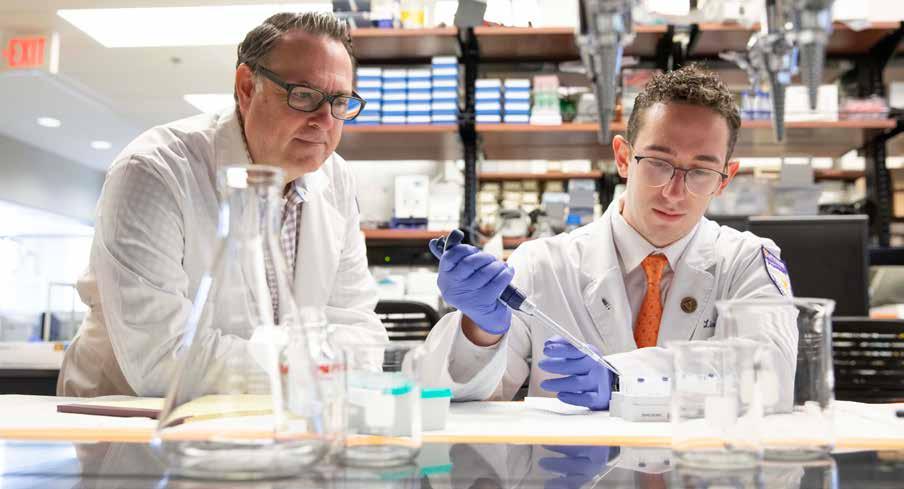
Lipscomb-Inotiv partnership and new master’s program promise to fill a gap in the scientific research community.
Thanks to an innovative new partnership with Inotiv, a nationwide contract research organization, Lipscomb’s College of Pharmacy students now have broader career pathways open to them and the opportunity to get one-on-one, applied drug development research experience while still earning their advanced degree.
Inotiv, which provides products and services focused on bringing new drugs and medical devices through the discovery and preclinical phases of development, now operates its Nashville location out of 3,000 renovated square feet in Lipscomb’s Pharmaceutical Sciences Research Center.
Through a five-year partnership established in December 2023, Lipscomb is now able to draw on the expertise of Inotiv’s research scientists to provide one-on-one, real-world industry research experience for students, all without leaving campus.
Lipscomb has expanded its degree offerings within the College of Pharmacy, adding a new Master of Science in pharmaceutical sciences degree designed to prepare students to continue on to a Ph.D. in pharmacology or to go directly into the pharmaceutical industry workforce as research scientists in contract research organizations such as Inotiv or major pharmaceutical companies.
Sending students straight into the industry is where the partnership with Inotiv
becomes so valuable for both the graduates and Inotiv, said Dr. Scott Akers, executive director of the Pharmaceutical Sciences Research Center and associate dean of research. Students can experience what the workplace is like even before they graduate, and Inotiv can develop a relationship with a potential employee entering a field that is currently short on new recruits, he said.
“We looked at this collaboration as a way to foster recruiting opportunities with exceptional people,” said Dr. Scott Daniels, Inotiv’s senior vice president of discovery and translational sciences, who works from the Lipscomb-Inotiv Laboratory on campus and is also a Lipscomb adjunct professor of pharmaceutical sciences.
Lino
this
the new Lipscomb-Inotiv lab to define the pharmacokinetics, drug metabolism and potential drug-interaction liabilities of clinically approved medications as well as experimental therapeutics.
(below left) The Lipscomb-Inotiv lab operates out of more than 3,000 square feet in the Pharmaceuticals Sciences Research Center.
Both Akers and Daniels say they see a need in the industry for more pharmaceutical research-trained scientists focused on applied drug discovery and clinical development.
“Pharmaceutical science research and education training is becoming more rare in the academic world,” said Daniels.
“Lipscomb sensed the deficit and seized an opportunity to partner within Inotiv’s mission and approach. When we see a master’s program at a fine institution surface, and it meets one of our greatest needs, we jump on it.”
Since 2006, Akers has developed a focus on pharmacokinetics (the study of how the body processes and excretes a drug) at Lipscomb by pursuing grants to conduct clinical research and by training Pharm.D. graduates with the skills needed to pursue a Ph.D. in pharmacological sciences through a pathway program with Vanderbilt University. Through this focus, Pharm.D. students have been able to supplement their studies with research experience in projects supported by the American Heart Association, National Institutes of Health, Northwestern University, Vanderbilt and Cleveland Clinic, to name just a few.
Now, partnering with Inotiv opens a new path for Lipscomb students who may want to pursue a career in pharmaceutical sciences without earning a Pharm.D.
degree. Inotiv can provide hands-on training in the nonclinical and analytical drug discovery and development services it provides to pharmaceutical and medical device industries.
“Their interests overlay nicely with our interest in pharmacokinetics and drug metabolism, and by having them in-house, we can have Inotiv scientists help train our master’s students,” explained Akers.
The relationship between Lipscomb and Inotiv grew from a relationship between Akers and Daniels, begun 12 years ago, when Daniels was a professor at Vanderbilt’s pharmacology department and on the receiving end of Lipscomb students in the Pharm.D. to Ph.D. Pathway Program. The two have published together, and over the years both became involved in Inotiv.
“Scott Akers was a progressive thinker on the interdisciplinary nature of research,” Daniels said, “and interdisciplinary is how biopharmaceutical companies operate.”
Daniels left Vanderbilt in 2016 and is now leading Inotiv’s discovery staged business spanning three states, including Tennessee. He established a new Inotiv lab at Lipscomb in order to provide growth opportunities for its newest discovery team—Platformed Technologies.
This summer, pharmacy student Lino Gaglio is the first Lipscomb master’s student to partner with an Inotiv researcher. By employing a novel two-dimensional

human liver cell culture system, Gaglio aims to define the pharmacokinetics, drug metabolism and potential drug interaction liabilities of clinically approved medications as well as experimental therapeutics. The project further highlights the importance of validating these types of cultured organ models in order to effectively characterize drug candidates during the discovery stage.
Nine students, five being current Lipscomb Pharm.D. students earning a dual degree, are enrolled in the master’s program as of this summer.
“This partnership is a truly symbiotic relationship,” said Akers. “We can take a student and put them right on the front lines of one of the leading contract organizations in the nation.”
“It is one piece of the pharmaceutical industry’s discovery engine, but this is a uniquely positioned match,” said Daniels. “Whether students come to work at Inotiv or if they use this relationship as a springboard to go to another company, to teach or go into governmental research and policy, we feel that it is our responsibility in the scientific community to be a part of this important training mission.”
According to Akers, the master’s program “makes us much more diverse in where we can send our graduates,” allowing them to graduate directly into industry positions and rare fellowships like the clinical pharmacologist position that May 2024 Pharm.D. graduate Dr.
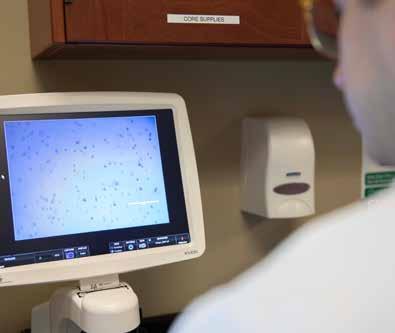


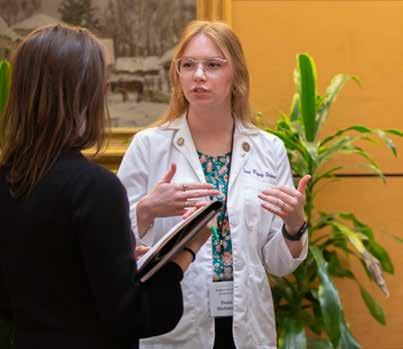
Anne Carlisle earned at Boehringer Ingelheim, one of the largest private pharmaceutical companies in the world.
Currently, master’s students are working on various pharmacokinetics research projects (outside of the Inotiv lab) such as:
Dana Dishman’s study determined the stability of an asthma drug in order to prepare it in larger volumes for a pediatric trial. Working with pediatric physicians at the Monroe Carell Jr. Children’s Hospital at Vanderbilt. Dishman and Akers found that the drug montelukast is stable for at least 72 hours in pharmaceutical grade liquid suspension. This compounded suspension is currently being used in the clinical trial to determine patientspecific pharmacokinetics in easing acute asthma attacks in children. (See more on page 44.)
Dishman, who had done research during her undergraduate years, switched from pursuing Lipscomb’s pharmacy management dual degree to the master’s of pharmaceutical science once it became available. She appreciates the opportunity to work with researchers, internationally in some cases, and the ability to work hands-on with biomedical equipment, she said. “This degree has expanded my world a lot,” said Dishman, who will graduate in 2026.
Ashley Rector worked to develop a measurement of the breast cancer drug doxorubicin in the body to see if it could ultimately be paired with other drugs in a human trial. Her work showed how much concentration of the drug was found in human plasma to compare to the dosing amounts administered. She is also learning how to model and simulate human drug exposure using industry leading pharmacokinetic software and will graduate with the pharmaceutical science dual degree in May 2025.
Joanna Cravens’ and Katelyn Covington’s research developed a way to measure the levels of three separate drugs in a blood sample to support a human clinical trial using ifetroban to treat patients with idiopathic pulmonary fibrosisl. Covington and Cravens developed an assay as a way to measure the drugs nintedahib, pirfenidone and ifetroban simultaneously in patient samples that will be analyzed by Akers’s laboratory. Developing this assay will be critical for evaluating potential drug interactions with ifetroban since both drugs will continue to be administered to patients during the clinical trial.
“This master’s will broaden what I can do in my career,” said Covington. “I was considering a clinical hospital position, but now I may go into research in industry, perhaps apply for fellowships.”
Kevin Wu conducted tests on a novel peptide drug to see if it is effectively absorbed into the body to treat heart arrhythmias. Wu, a Nashville native with a chemistry and engineering bachelor’s degree, found that only 16% of the drug administered as an oral dosage form reached the bloodstream. He has recently conducted experiments in Akers’ laboratory to see if the drug is stable in gastrointestinal fluids and how much of the drug is metabolized in the intestine or liver prior to reaching the bloodstream.
The master’s “is such a unique opportunity,” said Wu, “and it added credence to our role as pharmacists. It helps us make better decisions for our patients.”
Scan the code to read more, and if you are interested in partnering with Lipscomb’s Pharmaceutical Sciences Research Center, contact scott.akers@lipscomb.edu to become involved.
















































This spring, Lipscomb announced three new graduate-level programs designed to enhance graduates’ value in the ever-changing marketplace and to build on faculty’s academic and industry expertise. All three are among the first such programs in the city or state and are designed to leverage Lipscomb’s existing strengths in faculty knowledge and real-world experience and apply it to recent trends and changes in society and the marketplace. Each program will begin courses in August.
This program is designed to meet the growing demand across industries for AI expertise among those without a computer science background. School of Computing faculty will use hands-on projects, industry partnerships and collaborations with industry experts, to help students gain practical experience and real-world insights to position themselves for success in the rapidly evolving AI landscape. In the 18-month program, students will learn the fundamental concepts of AI, its capabilities and limitations and the ethics involved. The focus is on practical application in student-selected specific fields: engineering, health care, entertainment and the arts, literature, education, environmental and sustainability science, business, finance and analysis. A graduate certificate is also available.
This program will train students for analytical positions in professional and collegiate sport as well as other entertainment and sport-related careers. The collection and analysis of data is crucial for many careers in sports, including e-sports, finance, media and sports marketing agencies. The comprehensive program offers courses in applied statistics, legal and ethical considerations in sport, consumer behavior analytics, predictive modeling, intellectual property and management of student-athletes name, image and likeness. Students will gain a holistic view of the industry’s analytical applications. The program includes built-in capstone opportunities, expert faculty mentorship and extensive networking opportunities.
These post-baccalaureate certificates offer a short-term path for artists and entertainment professionals to advance their careers in a rapidly evolving industry. Students may complete one certificate at a time in a specific area of interest—screenwriting, television writing, animation foundations and 2D advanced animation—then combine certificates for a custom MFA in entertainment, design and creative enterprise if desired. The graduate certificates are led by professors with real-world industry experience and include unique educational opportunities like the Writers Room Intensive and opportunities to engage with industry leaders through guest lectures, workshops, travel study opportunities and networking events.

Five faculty bring their expertise to patients at premier medical center.
The scholars of Lipscomb need no reminding to take full advantage of the university’s prime location in Nashville, a thriving, growing city with a wealth of resources and opportunities for its residents and college students.
Lipscomb’s College of Pharmacy faculty with expertise in interprofessional education, drug development and clinical research are able to multiply the power of their scientific scholarship by teaming up with two of Nashville’s largest resources—Vanderbilt University, regularly ranked as two of the nation’s top universities, and Vanderbilt University Medical Center, one of the nation’s premier medical centers.
Through this long-time partnership, Lipscomb is maximizing opportunities to make a difference in the world on a national scale, and the university’s focus on involving students in hands-on research, means students can share a big role in that change-making as well.

Dr. Scott Akers Executive Director of Pharmaceutical Sciences Research & Associate Dean
of Research
TEAM Trial: Dose escalation clinical trial of highdose oral montelukast to inform future RCT in children with acute asthma exacerbations
Funded by the National Institutes of Health’s National Heart, Lung, and Blood Institute
Vanderbilt’s Principal Investigator: Dr. Don Arnold
In July 2023, Akers began working on a clinical trial in pediatric patients who come to the emergency room suffering from acute asthma attacks. The study is testing whether the drug montelukast, currently used to prevent asthma attacks on a daily basis, can also be used in high doses to treat children already in the midst of an acute attack in the emergency room.
In the current phase of the trial, staff at the Monroe Carell Jr. Children’s Hospital at Vanderbilt are treating children with the drug and taking blood samples to send to Lipscomb, where Akers and his student research assistant, Dana Dishman, measure the drug levels in the blood to help determine how much the next dose should be in the next group of subjects. The trial is expected to run for two years.
This type of study is an example of how pharmacokinetics can be used to understand how
a drug is absorbed, distributed, metabolized and eliminated by the body, an area of expertise that research faculty in Lipscomb’s Pharmaceutical Sciences Research Center has developed over the past 17 years.
“Pharmacokinetics impacts the dosing of every drug on the market,” said Akers. “You have to understand how to control the blood levels in the body to make the drug safe and effective. While it’s important to understand how a drug works, you need pharmaceutical scientists to help design dosage regimens in different patient populations to bring the drug to market.”

Dr. Zachary Cox
Professor of Pharmacy Practice & Adjunct Professor at Vanderbilt School of Medicine
A Randomized Trial of Protocolized Diuretic Therapy Compared to Standard Care in Emergency Department Patients with Acute Heart Failure
Funded by National Institutes of Health
Vanderbilt’s Project Director: Dr. Sean Collins
Pollypill Trial: Polypill Strategy for the EvidenceBased Management of Heart Failure with Reduced Ejection Fraction in an Underserved Patient
Population
Funded by National Institutes of Health
Vanderbilt’s Project Director: Dr. Deepak Gupta
Since coming to Lipscomb in 2009, Cox’s main focus of research has been exploring various drug therapies to reduce diuretic resistance (the build-up of fluid and sodium in the body) in hospitalized acute heart failure patients. At any one point in time, Cox is carrying out around 10 clinical trials with Vanderbilt patients as either the principal investigator or a consultant.
The two primary clinical trials he is carrying out during the 2023-2024 year build on his past research by investigating novel medical therapies, or those that haven’t been previously reported in the scientific literature, to treat patients with heart failure.
The ESCALATE trial is a multicenter trial enrolling 450 patients hospitalized with heart failure to a strategy of protocolized diuretic therapy guided by spot urine sodium concentrations through completion of intravenous diuresis compared to usual care. Cox was instrumental in designing the study and serves as the site investigator at Vanderbilt.
The Pollypill trial is investigating if combining the four core medications to treat heart failure into one pill can improve patient outcomes.
See more about Cox’s clinical trials at Vanderbilt over the past 15 years on page 21.

Dr. Susan Hamblin
Assistant Professor of Pharmacy Practice
The Partial REBOA Outcomes Multicenter ProspecTive (PROMPT)
Funded by Prytime Medical Devices Inc. with original funding from the U.S. Department of Defense
Vanderbilt’s Co-Investigators: Dr. Stephen Gondek and Dr. Bradley Dennis Hamblin is the lead study coordinator for the Vanderbilt site in a multicenter study of the efficacy and safety of the pREBOA-PRO™ catheter. REBOA stands for resuscitative endovascular occlusion of the aorta. It is a device used to slow internal bleeding in patients who are exsanguinating.
This prospective, observational study is investigating the efficacy and safety of the
pREBOA-PRO catheter (designed to allow for partial aortic occlusion) compared to a historical control group of patients who received the original REBOA catheter. This trial began enrolling Vanderbilt patients in August 2023.
Vanderbilt is the lead site, so Hamblin has leadership roles among various study sites, as well as coordinating research personnel, screening patients, collecting data, helping with data analysis, leading the monthly all-sites meeting for Prytime and ensuring compliance with all institutional regulations.

Dr. Sarah Uroza Associate Professor of Pharmacy Practice
University School of Nursing (VUSN) Nurse Education, Practice, Quality, and Retention Simulation Education Training Program
Funded by the U.S. Health Resources and Services Administration
Vanderbilt’s Project Director: Dr. Christian Ketel VUSN faculty, the Vanderbilt School of Medicine and the Vanderbilt School of Divinity are collaborating with Lipscomb’s College of Pharmacy to create experiential learning opportunities to prepare nursing students to efficiently address health equity for rural and underserved populations.
In 2023, the group began working to develop a three-day simulation education training for faculty to prepare them to use simulation-based technology. Uroza plans to use Lipscomb’s pharmacy students within the simulation training.
Simulation scenarios will involve advanced patient assessments, diagnosis and recommended follow-up in the context of social drivers of health, the common realities faced by patients in a socially under-resourced and medically underserved health care setting.
The group is developing evaluation metrics to test competence in priority areas of patients’ behavioral/mental health including homelessness, maternal and child health, and aging.

Dr. Jessica Wallace
Associate Professor of Pharmacy Practice
Funded by the National Institutes of Health’s National Institute of Diabetes and Digestive and Kidney Diseases
Vanderbilt’s Principal Investigator: Dr. Edward Siew
This randomized study is designed to evaluate if a multimodal process of care intervention, delivering different types of therapy together, may improve outcomes in patients following hospitalization for acute kidney injury (AKI). This multicenter study includes not only Vanderbilt University, but also Yale and Johns Hopkins universities and the Cleveland Clinic among its eight sites.
The goal is to determine if multimodal care intervention, including care by a pharmacist, nurse navigator and nephrologist plus home blood pressure and weight monitoring devices, will result in more hospital-free days and better patient-reported outcomes over three months and lower rates of major adverse kidney events and rates of recurrent injury over six months.
As the pharmacist on the Vanderbilt intervention care team, Wallace evaluates appropriate drug dosing based on kidney function, nephrotoxic burden and drug interactions. She also helps educate patients about kidney injury, medications to avoid and medication adherence and assists with medication access and barriers to care.
Faculty in the College of Pharmacy have been partnering with the nation’s top institutions since the college was founded. Scan the code to read more, and if you are interested in being a part of their research, contact
lipscomb.edu/
officeofresearch@lipscomb.edu

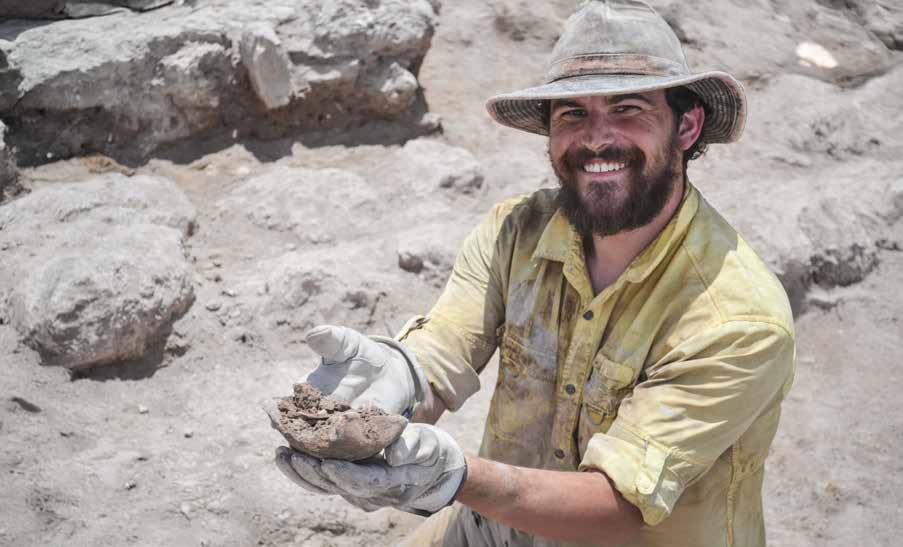
Archaeology center’s radiocarbon dating at site mentioned in the Bible makes waves in the scholarly community.
The Lanier Center for Archaeology (LCA) had a milestone year this past school year, with findings from its Tel Gezer Excavation Project, located in central Israel and dating back 3,000 years, published in PLOS ONE, and significant contributions to biblical archaeology published in the Biblical Archaeology Review (BAR) in May, among other publications and scholarly events.
The PLOS ONE article, published in November, put forth new evidence that contributes to the ongoing debate about
the historical accuracy of biblical narratives, including the chronology of Israeli kings David and Solomon.
Dr. Steven M. Ortiz, director of the Lanier Center; and Marcella Barbosa, collections manager and education coordinator; published the article, “The Chronology of Gezer from the End of the Late Bronze Age to Iron Age II: A Meeting Point for Radiocarbon, Archaeology Egyptology and the Bible,” along with coauthors from Austria, Israel, The Netherlands, Canada and Australia.
The article rippled through scholarly circles, sparking responses and ongoing debates.
Several more academic journals as well as popular periodicals took note of the PLOS ONE article, including Haaretz, Phys.Org, Science Daily, Newsweek, Armstrong Institute of Biblical Archaeology, and others, as well as The Jerusalem Post, Israel’s English news website.
What distinguishes this particular study is the findings from multilayered radiocarbon dating—known as C-14 dating—a scientific method that can help determine the age of organic materials. The team used charred seeds that have a short growing period, collected from the floor of a large administrative building, for the precision dating.
In 10 years of field work, the excavation teams, which include Lipscomb master’s and doctoral students, discovered about 15 layers of occupation in Gezer and were able to collect radiocarbon samples from most layers, said Barbosa, who is also a doctoral candidate in the program and the leader of the 2016 and 2017 Gezer excavation teams.
The LCA’s C-14 dating research reveals that the site corresponds to historical events from written sources, including the Bible. These results allow researchers, for the first time, to independently determine the site’s chronology, test proposed historical correlations and contribute to debates on Israelite, Philistine and Iron Age chronology.
The ancient city of Gezer is located in the foothills of the Judaean Mountains, roughly midway between Jerusalem and Tel Aviv. It is often mentioned in Egyptian, Biblical and Assyrian sources and is associated with power struggles, conquests and historical figures such as King Solomon, his unidentified pharaonic father-in-law and the Egyptian pharaoh Merenptah.
In the BAR article, “Solomon’s Powerplay: Gezer’s Royal Complex Confirmed,” Oritz and Samuel Wolff, of the W. F. Albright Institute for Archaeological Research in Jerusalem, Israel, present new archaeological evidence that in the time of Solomon, Gezer boasted a monumental gate and administrative complex that was meant to convey power and authority over newly acquired territories in the area. They argue that these structures are a correlation to the biblical passage 1 Kings 9:15–16, which notes that among his many claims to fame, King Solomon fortified the royal cities of Hazor, Megiddo and Gezer.
The Lanier excavation teams at Tel Gezer focused on fully exposing the administrative building and surrounding features as well as the full length of the casemate wall. The results confirm that during the 10th century, Gezer was a fortified city most likely administered by a royal authority, said Ortiz.
With Tel Gezer now in its publication phase after a decade of excavation from 2006 to 2017, the meticulous process of interpreting the wealth of data collected in the field is expected to continue by Lipscomb professors and students for years. Ortiz, Barbosa and Ph.D. students Charissa Wilson and Katherine Hesler are spending several weeks this summer in the Gezer lab in Israel working on this process.
In the 2023-24 academic year, the Lanier Center also continued its rise as an academic leader by attracting top scholars to participate in its annual conferences. Each year the center holds two conferences intended to provide archaeology students access to the top minds in the field and opportunities to present their work, while also engaging broader academic disciplines and informing non-specialists.
The LCA’s fall conference was about “The Western Boundaries of Ancient Judah” and the spring conference was about “Conflict and Coexistence: Jews, Christians, and Muslims in Late Antiquity.” Each conference included presentations by Lanier students and a keynote lecture that was free to the public.
In 2024, the center held a third, international conference, “Pitfalls and Paradigm Shifts: The Fall and Rise of Biblical Archaeology,” in partnership with the Lanier Theological Library and Learning Center in Houston, Texas, with scholars from Europe, the Middle East and throughout the United States attending.
Lanier’s excavation work continues this summer with master’s and doctoral students traveling to dig sites such as Tel Burna and Kourion, as well as the Tel Gezer laboratory.

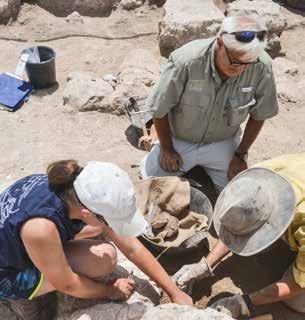
Learn more about Lipscomb’s archaeology program at lipscomb.edu/gezer.

A crucial part of discovery is sharing developing new knowledge with the Academy. At academic conferences around the world, scholars refine, mold and embrace intellectual thought to build on what we know and to reveal what we do not. Lipscomb’s
2023 American Schools of Oriental Research
Boston, Massachusetts, November 2023
Lanier Center for Archaeology
Clay Carpenter (PhD ’23)
“On the Cosmic Context of the Sanctuary of Apollo Hylates at Kourion”
Kristen Flake and Clay Carpenter (PhD ’23) “The Earth is Filled with Thy Creation: Psalm 103 (104) and the Floor Mosaics in the Church of Sts. Lot and Procopius”
John Harmon
“Nuri Temple 400: An Interpretation of its Monumental Function and Dating”
Savanna Henning and Laura Swantek
“Bringing the Past to the Future: Preservation and Accessibility of Written Data from the Sotira Kaminoudhia Excavations”
2023 Evangelical Theological Society
San Antonio, Texas, November 2023
Lanier Center for Archaeology
Katherine Hesler
“Canaanite Religion in the Patriarchal Period: Distribution and Analysis of the SevenCupped Bowl”
Scott Huff
“Tel Burna: Recent Work and the 2023 Season”
Mathew Bronson
“The ‘Hill Country of the Amorites:’ Middle Bronze Cooking Pots and Cultural Identity”
2023 Annual Biblical Archaeology Society, BAR Fest
San Antonio, Texas, November 2023
Lanier Center for Archaeology
Erika Brown
“Panel Discussion: 10 Important Finds in Biblical Archaeology”
World Conference for Gifted and Talented Children
Virtual, August 2023
National Association for Gifted Children Conference
Orlando Florida, November 2023
College of Education
Mentor: Dr. Emily Mofield
Chelsea England
“Using Collaborative Practices within MultiTiered Support Systems with Gifted and Talented Learners”
Tennessee Association for Behavior Analysis
Nashville, November 2023
College of Education
Mentors: Drs. Annette Little, Mary Lees, Pamela Scretchen
Jahniya Yates (MS ’24) and Chloe Tino (MS ’24)
“ABA Interventions for Individuals with Down Syndrome”
Dr. Kaitlyn Hadder (GC ’24)
“Decreasing Procrastination Behaviors in a University Student with Down Syndrome”
Chloe Tino (MS ’24)
“Effectiveness of the Use of Break Card or Positive Reinforcement to Reduce Elopement”
Ashton Berry
“Trained Behavioral Analysts—Knowledge and Readiness to Provide Services to Child Sexual Abuse Survivors”
Lexie Hayes
“Providing DRO While Implementing Functional Communication Training will Decrease the Likelihood a Child with Autism Spectrum Disorder will Engage in Physical Aggression in a Classroom Setting”
American College of Sports Medicine (Southeast Chapter)
Greenville, SC, February 2024
College of Health Sciences
Mentor: Dr. Laurel Littlefield
Allison Eddings (MS ’23)
“Effects of High-Intensity Interval Training, Endurance Training and Combined Training on VO2max, Body Composition, and Local Muscular Endurance”
American Society for Nutrition
Chicago, IL, June 2024
College of Health Sciences
Mentor: Dr. Laurel Littlefield
Adelia Salerno (MS ’23)
“The Effects of Body Position and Cadence on
graduate students are continually involved in this ongoing process. Below, check out some of the conferences’ and national meetings where graduate-level Bison researchers shared their knowledge this past school year.
Energy Expenditure, Exercise Intensity and Substrate Utilization During Indoor Cycling”
American Pharmacists
Association-Academy of Student Pharmacists
Orlando, Florida, March 2024 College of Pharmacy
Mentor: Dr. Justin Kirby
Ezra Docks and Mikayla Morrow, Winner Region 3 Innovative Programming Award “Student Pharmacist-Led Delivery of a Pharmacy Technician Certification Course for Local High School Seniors”
Academy of Managed Care Pharmacy Foundation
New Orleans, Louisiana, April 2024 College of Pharmacy
Mentor: Dr. Kam Nola and Vanderbilt University’s Dr. Chelsea Renfro
Ailsa Watson, won Best Poster Award “Assessment of the Implementation of Collaborative Pharmacy Practice Agreements in an Integrated Health System Specialty Pharmacy”
Alpha Chi
New Mexico, March 2023.
Department of Psychology, Counseling & Family Science
Mentor: Dr. Shanna Ray
Bailey McCarl (MS ’23), Winner of the Suzanne and J.T. Pundt Graduate Student Member Prize “Emotional Body Language and Social Cognition Deficits in Depression and Anxiety”
Alpha Chi
Birmingham, Alabama, April 2024
Department of Psychology, Counseling & Family Science
Mentor: Dr. Damian McClintock
Andrew O’Dwyer (MS ’24)
“The Enneagram: A Qualitative Outlook Using Thematic Analysis to Find One’s Congruency to Their Number”
Southeast Psychological Association
Orlando, Florida, March 2024
Department of Psychology, Counseling & Family Science
Mentor: Dr. Damian McClintock
Andrew O’Dwyer (MS ’24)
“The Enneagram: An Analysis of Perceived Type Congruence.”
Mentors: Drs. A.J. Heritage and Douglas Ribeiro
Jasmine Niazi (MS ’22)
“Understanding Muslim Mental Health Stigma through Religious Coping and Emotional Expression”
Mentor: Dr. A.J. Heritage
Gracen Kelly and Lexi Taylor (MS ’24)
“Imposter Syndrome, Gender and Personality in Academia”
Tennessee Psychological Association
Nashville, October 2023
Department of Psychology, Counseling & Family Science
Mentor: Dr. A.J. Heritage
Gracen Kelly and Lexi Taylor (MS ’24)
“Imposter Syndrome, Gender and Personality in Academia”
Global Voices
Nashville, April 2024
Department of School Counseling, College of Education
Faculty Mentor: Dr. Lisa Davies
Marilee Betz and Aletha Thomas
“Creating a Safe and Inclusive Classroom: Addressing Bullying as Current and New Teachers”
The 3rd Annual AWARE Youth Conference
Nashville, March 2024
Department of School Counseling, College of Education
Faculty Mentor: Dr. Lisa Davies
Julie Gibbons and Beth Peveler
“Pathways to Behavioral Health Careers Project through TN Department of Mental Health and Substance Abuse Services”
Lipscomb’s associate provost for research and graduate studies serves as chair of the Doctoral Education Council for international association of Christian universities.
For the first time, Lipscomb University will serve as the host of the Council for Christian Colleges and Universities’ biennial Doctoral Education Conference on Sept. 26-28 for leaders and faculty in doctoral education.
Dr. Trace Hebert, associate provost for research and graduate studies, serves as chair of the Doctoral Education Council which coordinates the conference that typically draws faculty and directors from CCCU’s 185 member-institutions around the world.
Educators in doctoral programs from throughout the CCCU system will present research, scholarship and the latest theory regarding the trends and developing challenges in doctoral education within faith-based institutions.
The conference was established in 2014 as a way to reinforce and communicate the high regard that faith-based institutions hold for credible research in doctoral education, said Hebert.
“When you look historically at higher education in the U.S. going all the way back to the 1800s, you see just how critically important the growth of doctoral programming has been to universities and to society.
“Unfortunately, with some exceptions, faith-based institutions have been somewhat challenged and even criticized for not being part of that trend. In the professional world, you have a lot of people who overlook faith-based institutions, believing that they are not as engaged as the rest of the higher education community in research and innovation.
“Our goal is to change that narrative,” Hebert said. “We have to emulate the value of credible research in order for us to have a
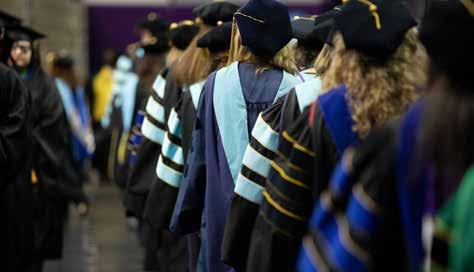
voice in the higher education community and to be taken seriously. Every year the conference grows, and we’re gaining steam as a professional organization.
“As an institution aspiring to rise to the Carnegie classification of high research activity, or R2, Lipscomb is honored to share with CCCU universities in this endeavor,” said Hebert, who continues to direct Lipscomb’s Doctorate of Education program, which began in 2010, and the Ph.D. in leadership and policy, which began in 2023.
Since its establishment, the Ed.D. program has grown to more than 100 doctoral students enrolled, and by 2015 the number of doctoral degrees awarded annually had grown to such a level that the institution was reclassified as a doctoral/professional institution by Carnegie, or R3, “a transformation that was a major event in the life of the institution,” said Hebert. “In the career of higher-ed professionals, it is rare to be part of transforming the classification of an institution and we endeavor to do it again.”
Lipscomb President Dr. Candice McQueen (BS ’96), who was education dean at the time the Ed.D. was established, will be a speaker at the CCCU conference.
Since 1976, the CCCU has served as the leading national voice of Christian higher education. CCCU institutions are accredited, comprehensive colleges and universities whose missions are Christcentered and rooted in the historic Christian faith. The organizaton’s mission is to advance the cause of Christ-centered higher education and to help our institutions transform lives by faithfully relating scholarship and service to biblical truth.

Lipscomb University’s professors and students are daily discovering, analyzing and changing our world through research. Students spend their days fighting cancer on numerous biological fronts or analyzing best practices in business, public service, sustainability and education. However, these discoveries require resources beyond what traditional funding can provide.


This is where YOU come in. Your investment empowers faculty and student researchers, facilitates collaboration as well as funds equipment and materials.
In classrooms and laboratories every day, the future is being discovered and crafted by Lipscomb Bisons. YOU can be a catalyst of change, unleashing the full potential of human ingenuity that makes the impossible possible.